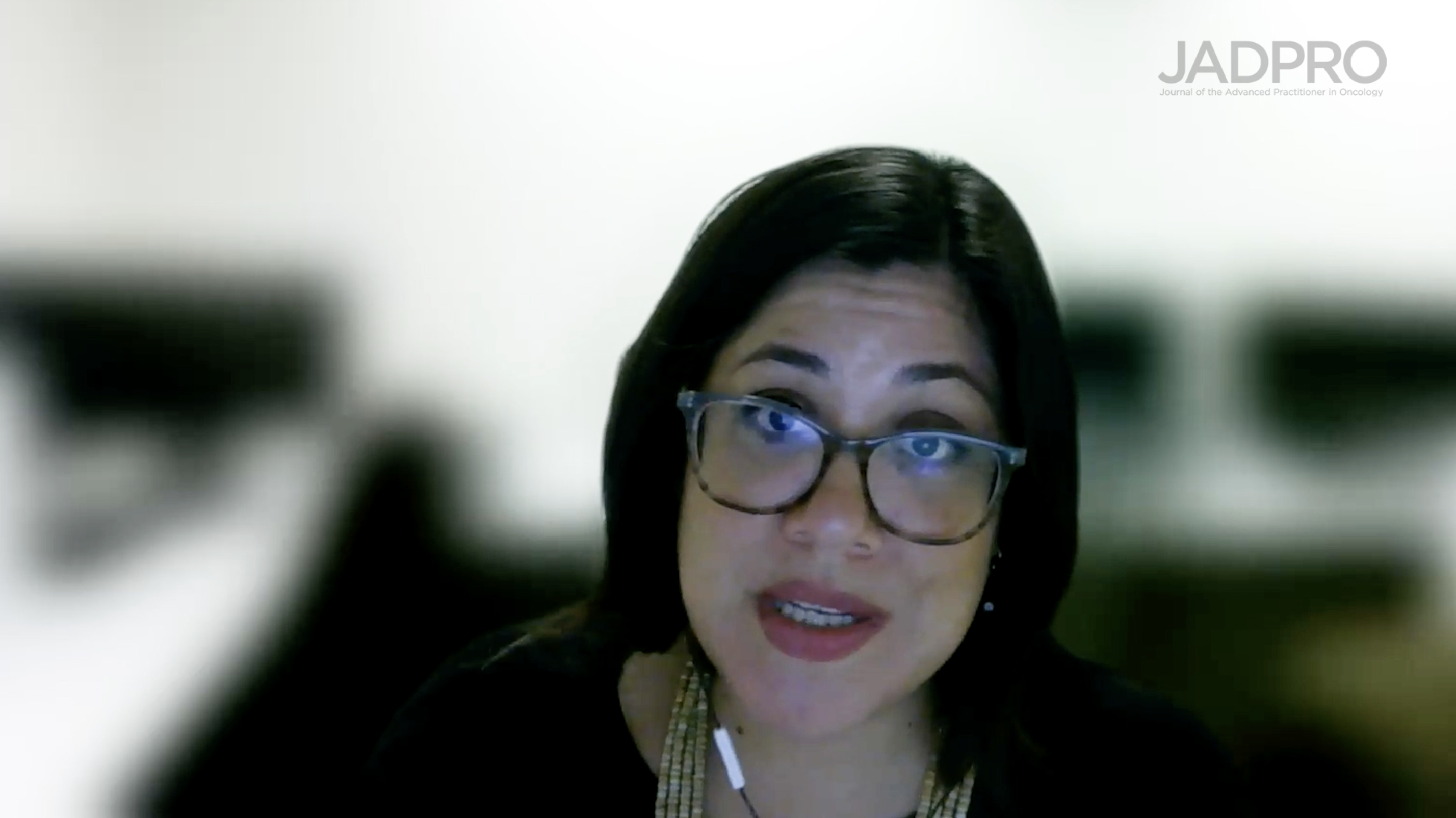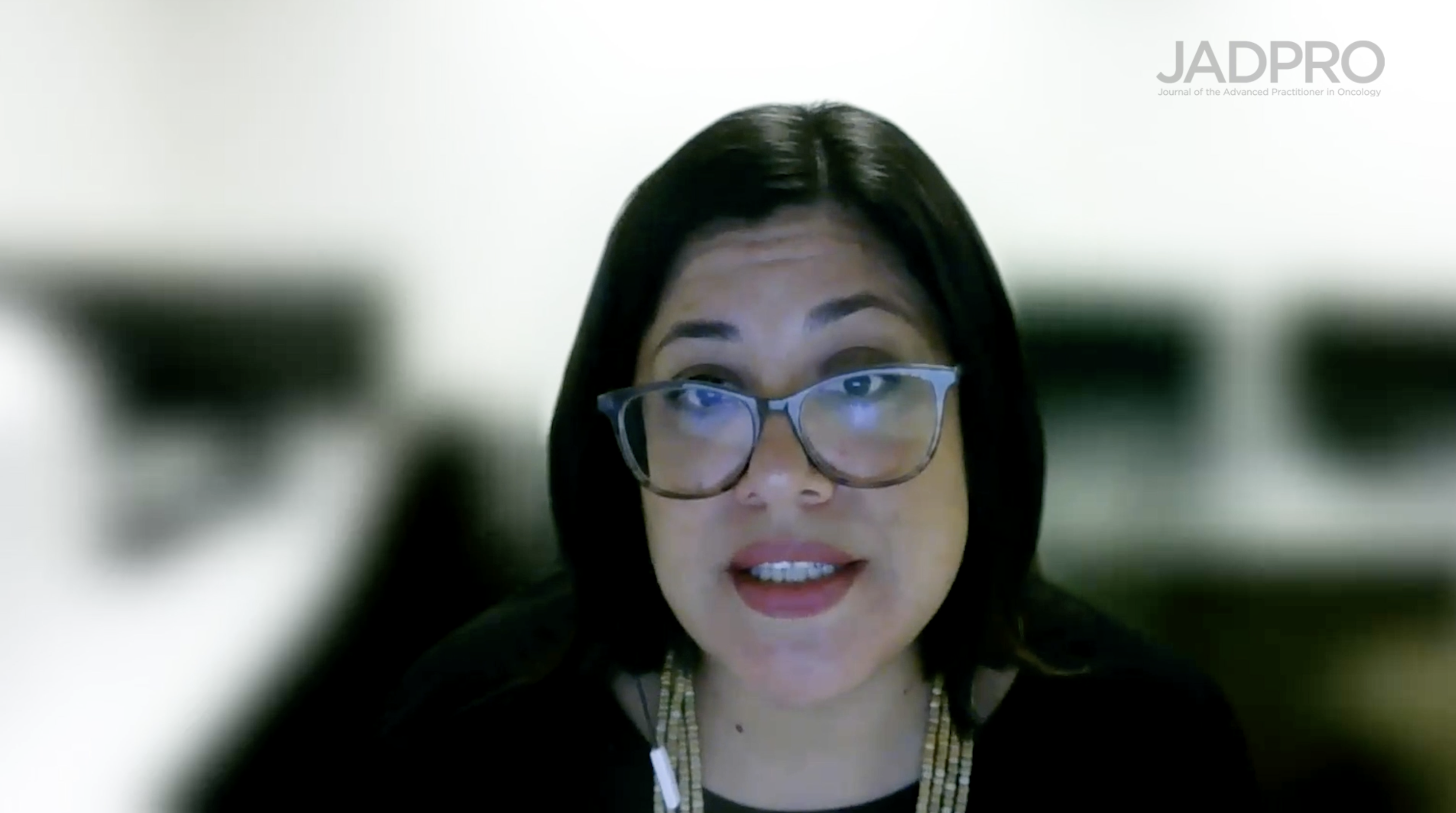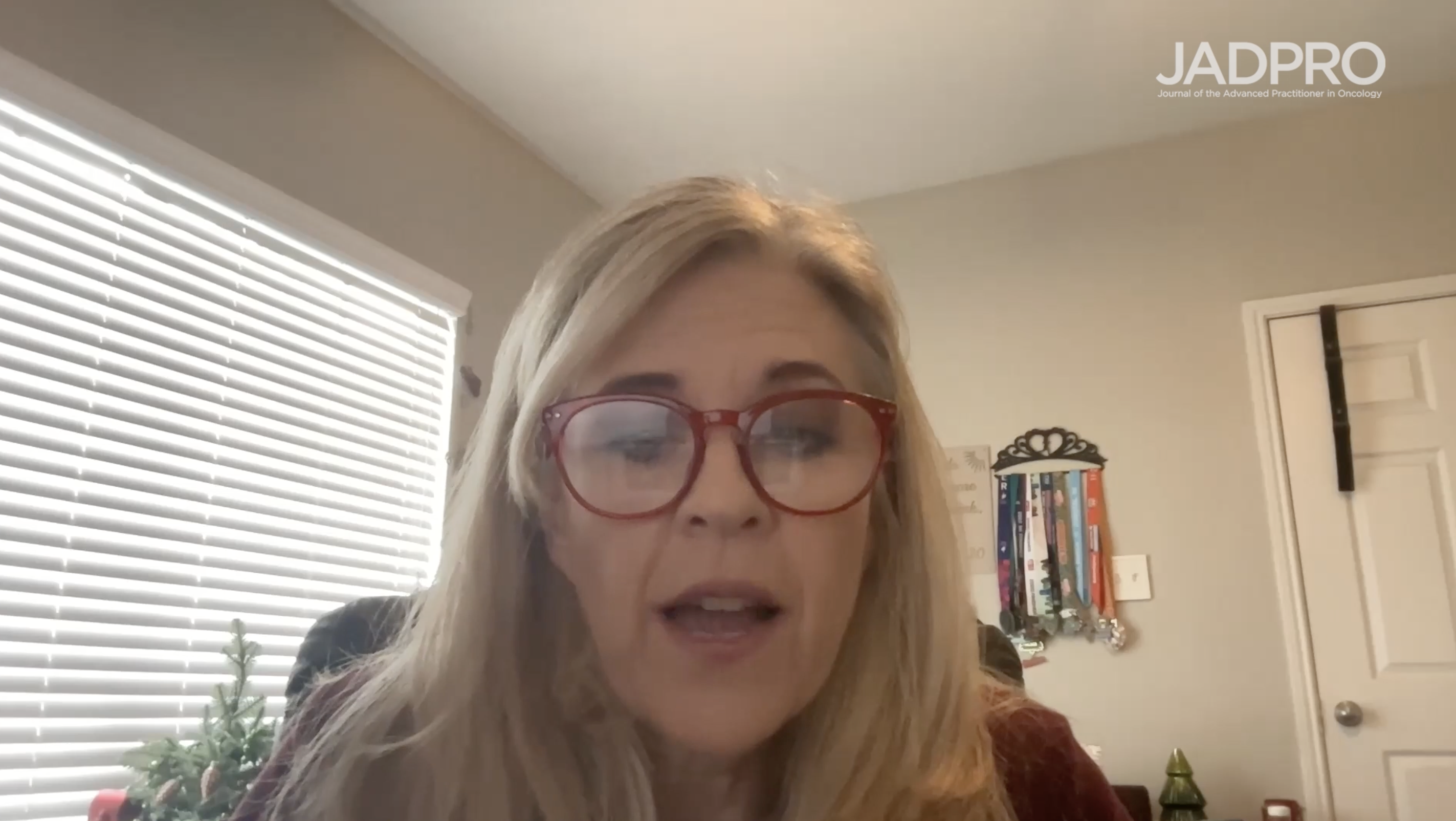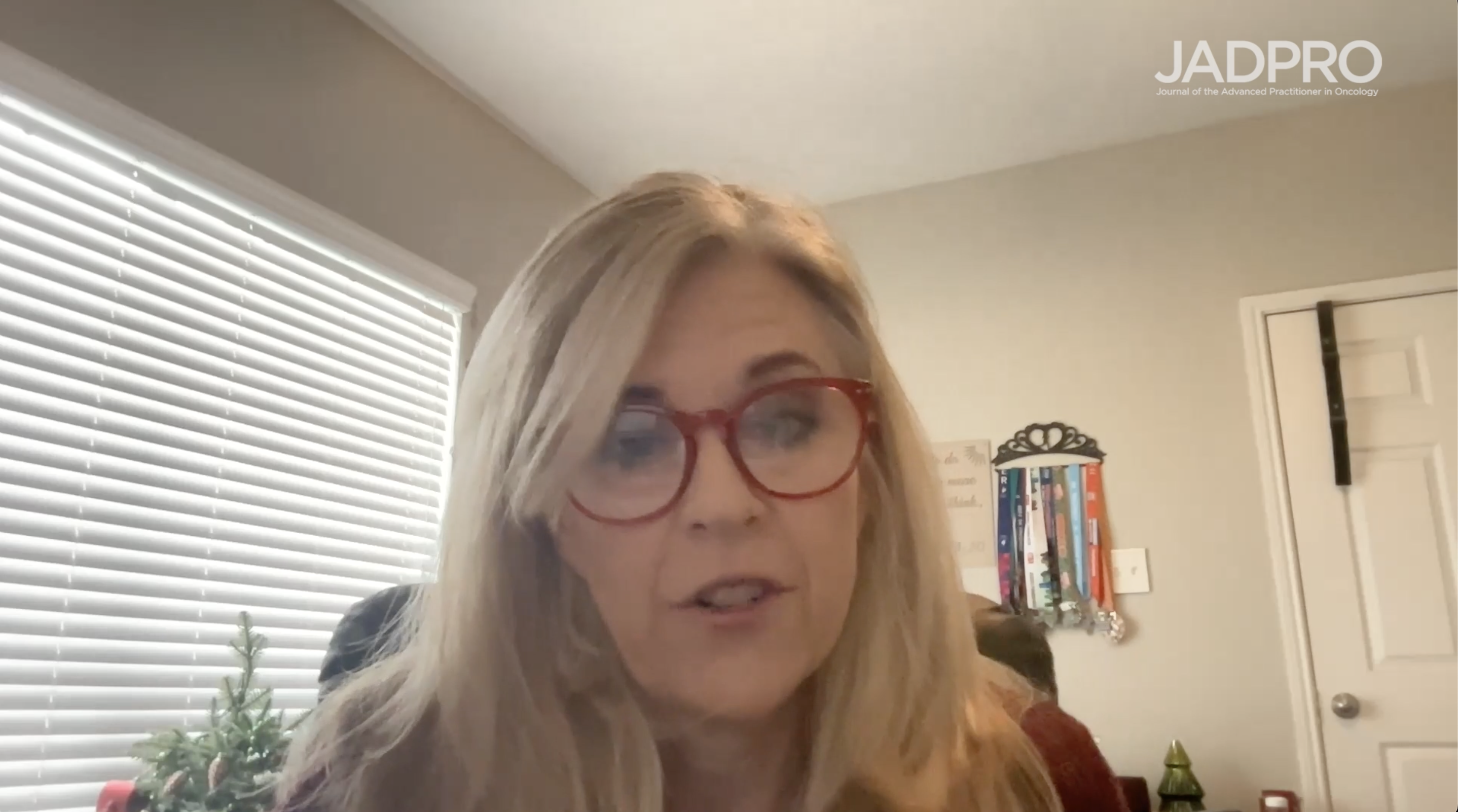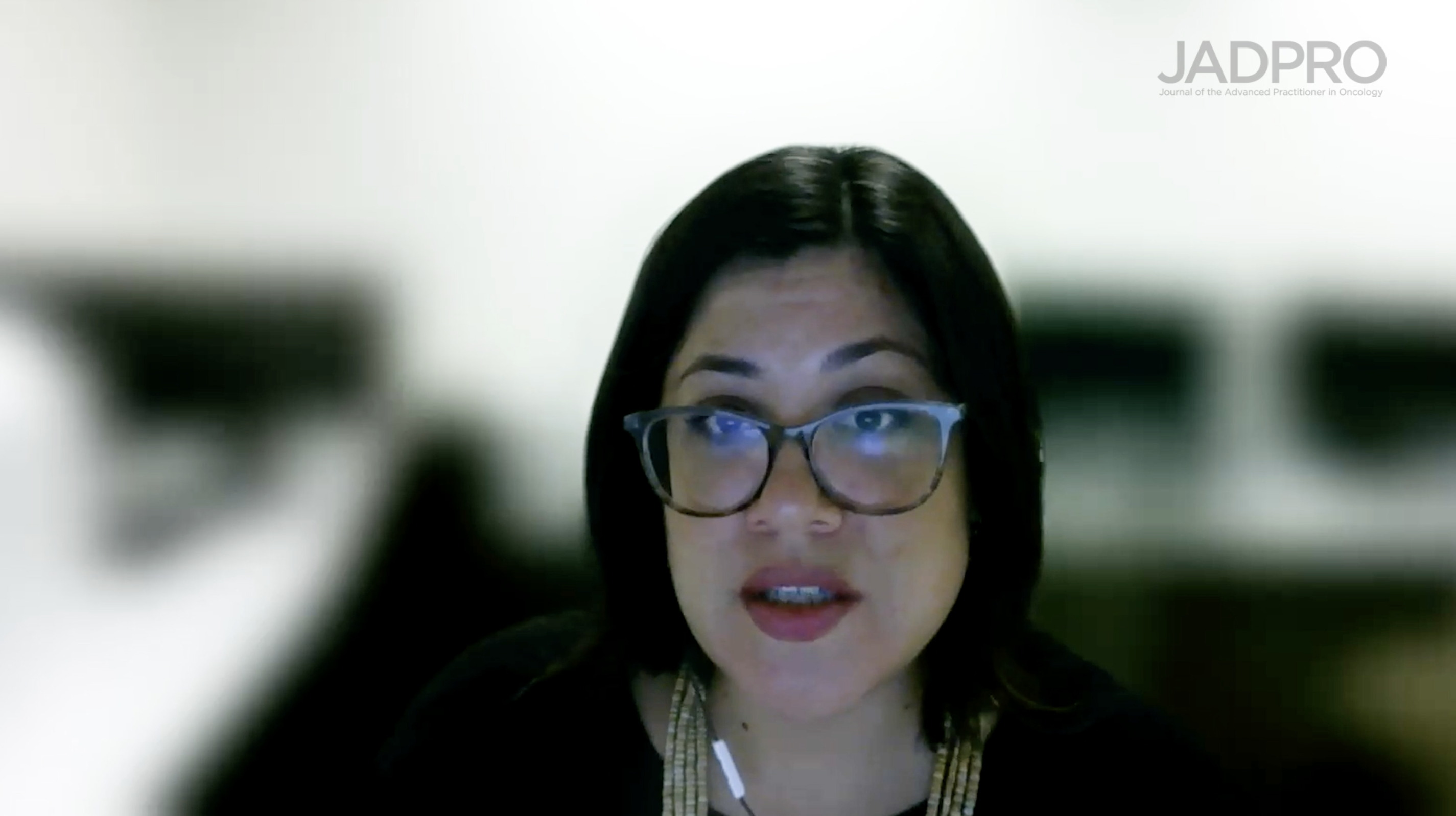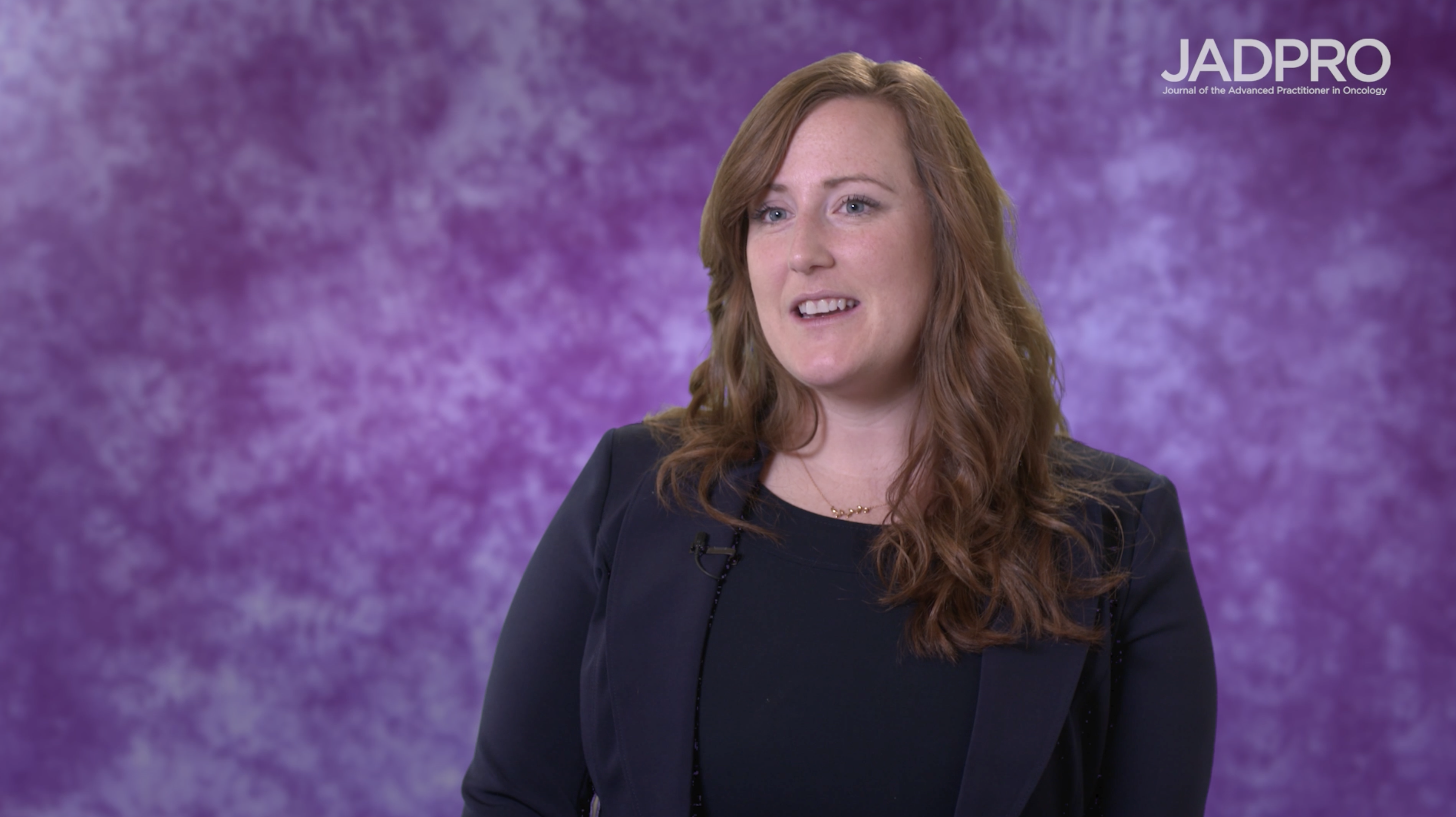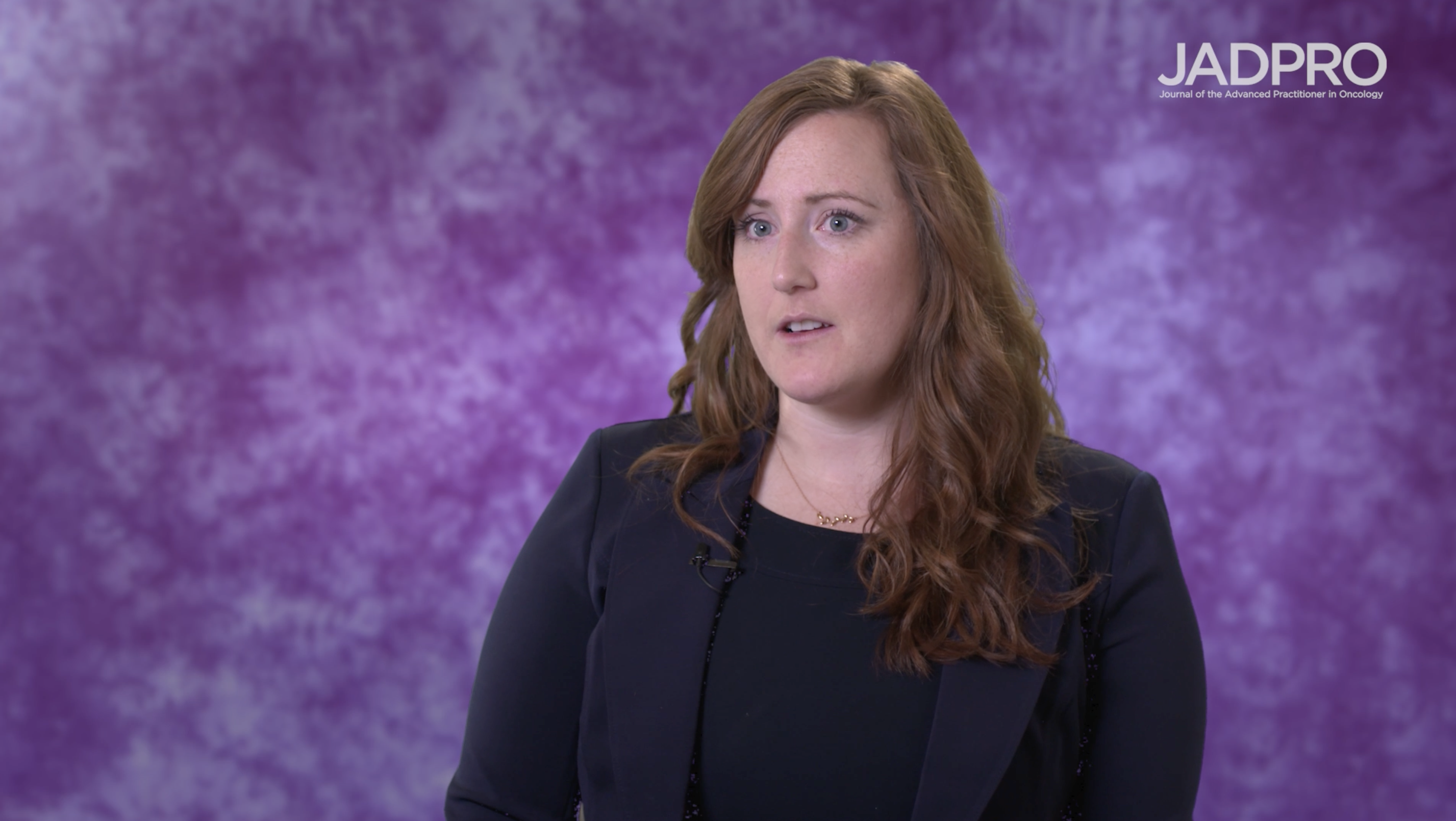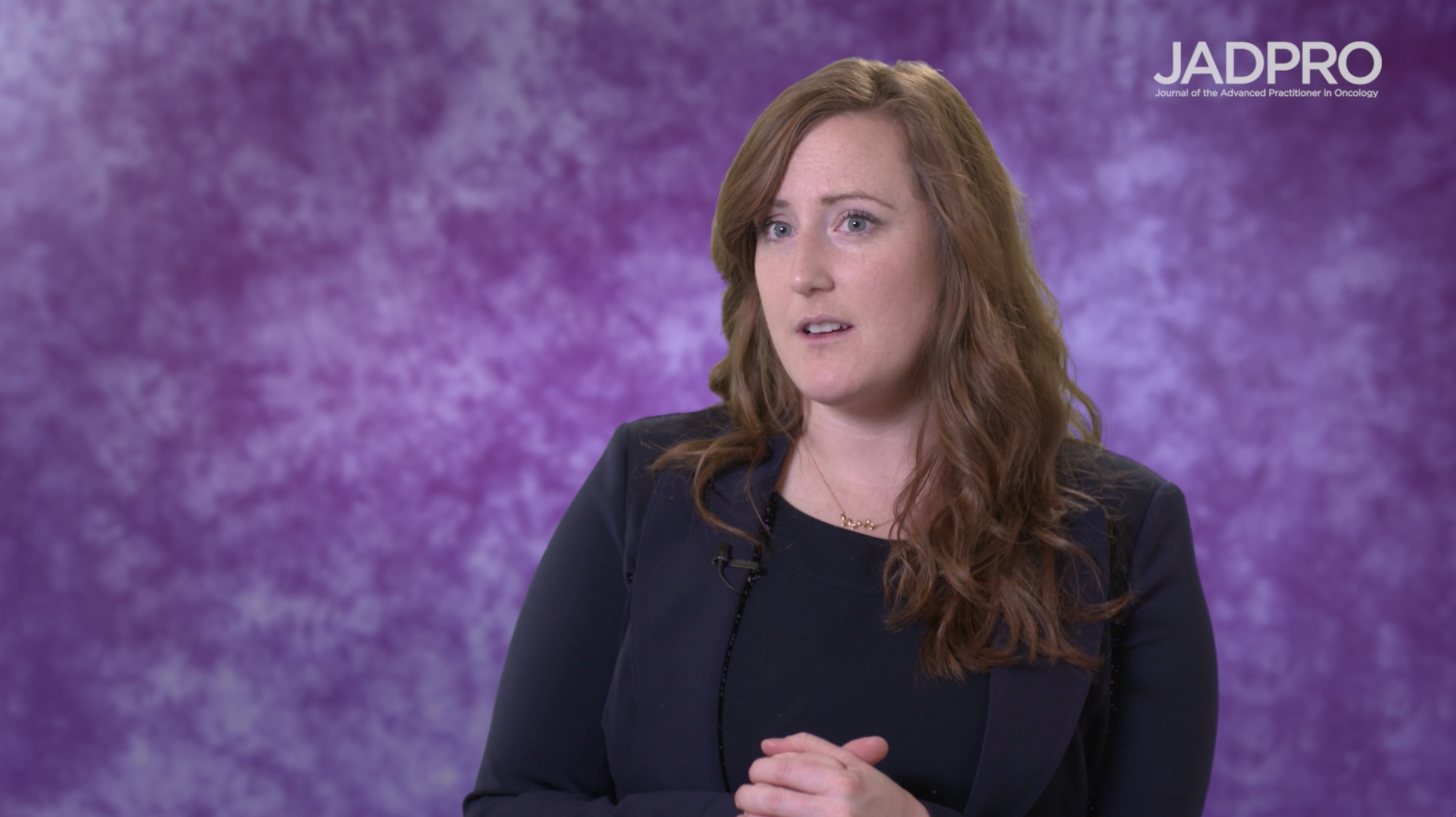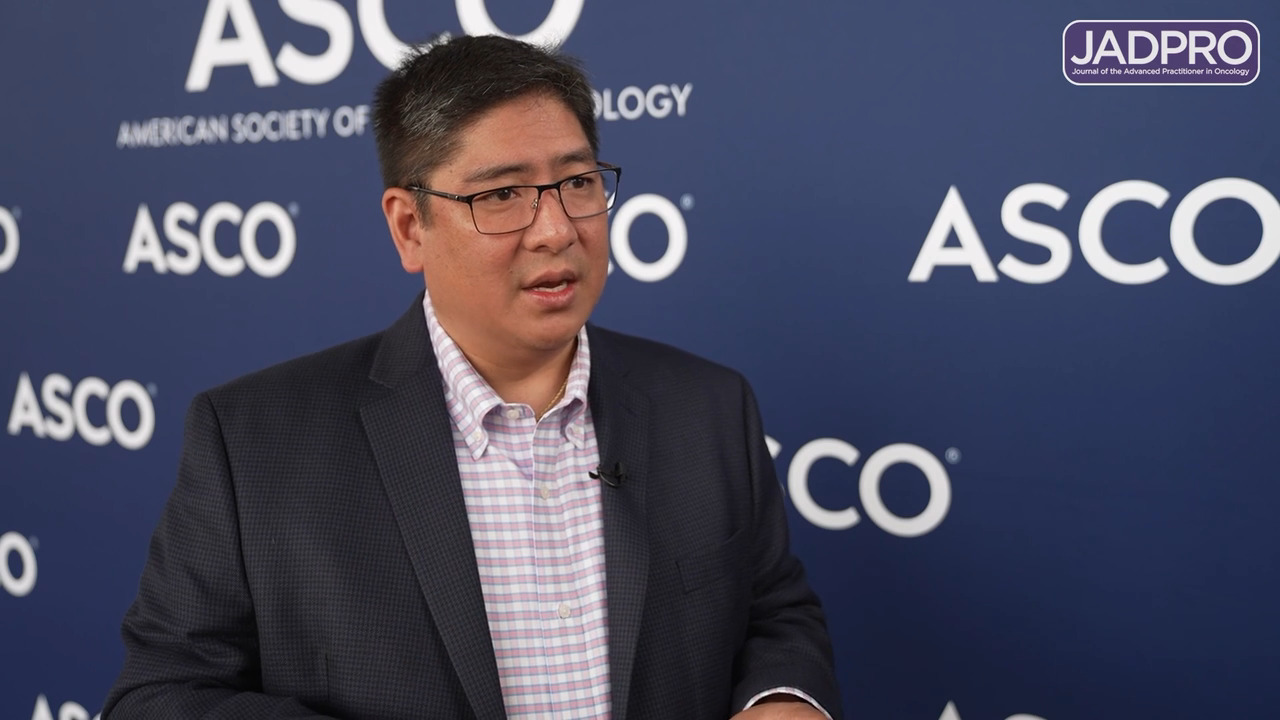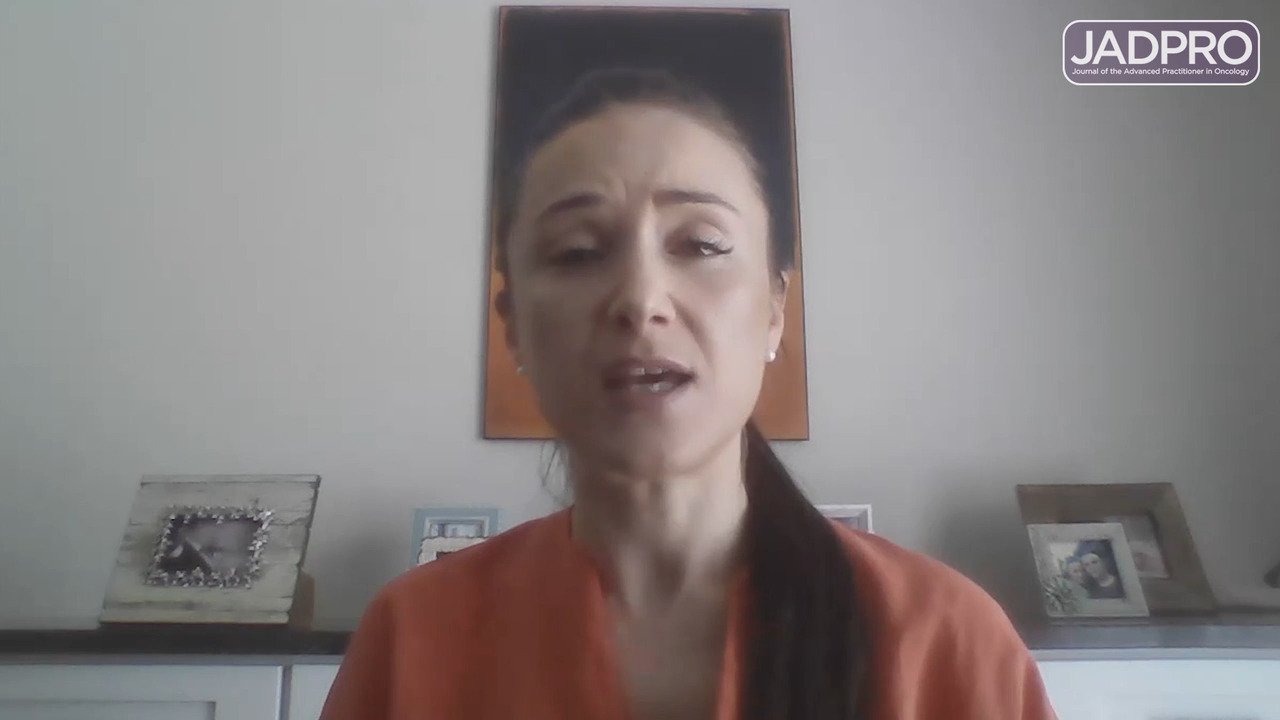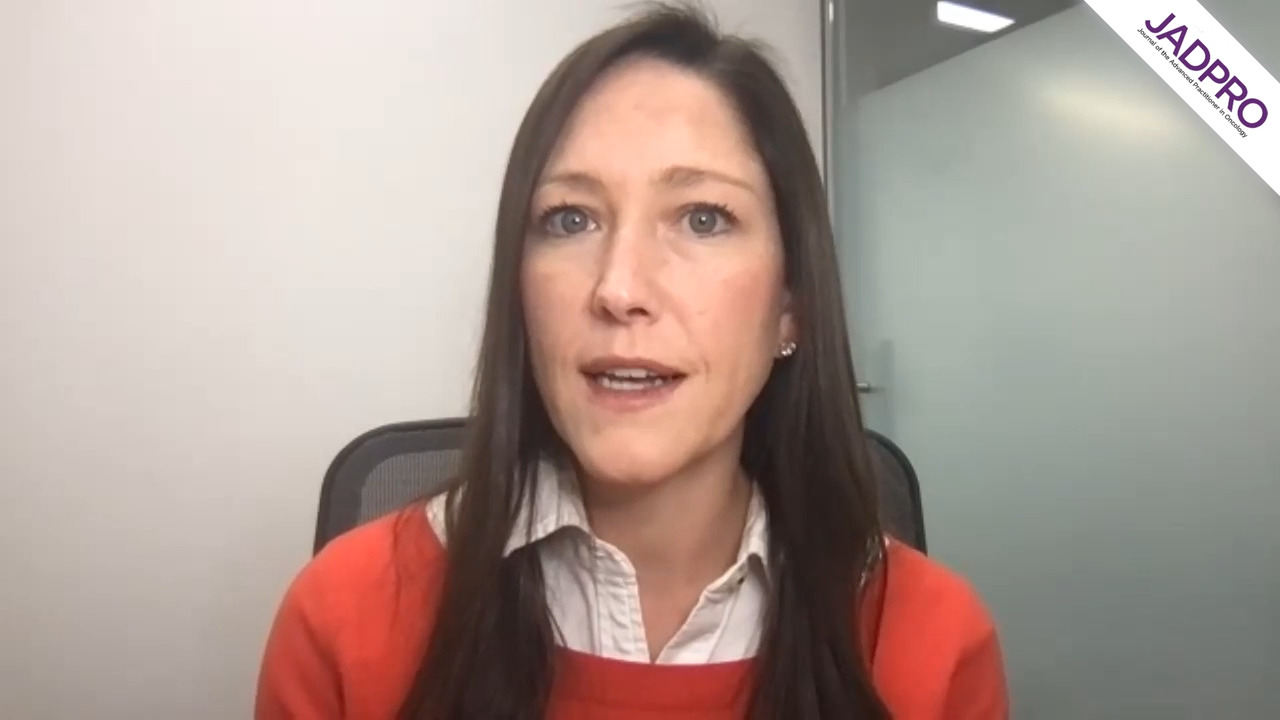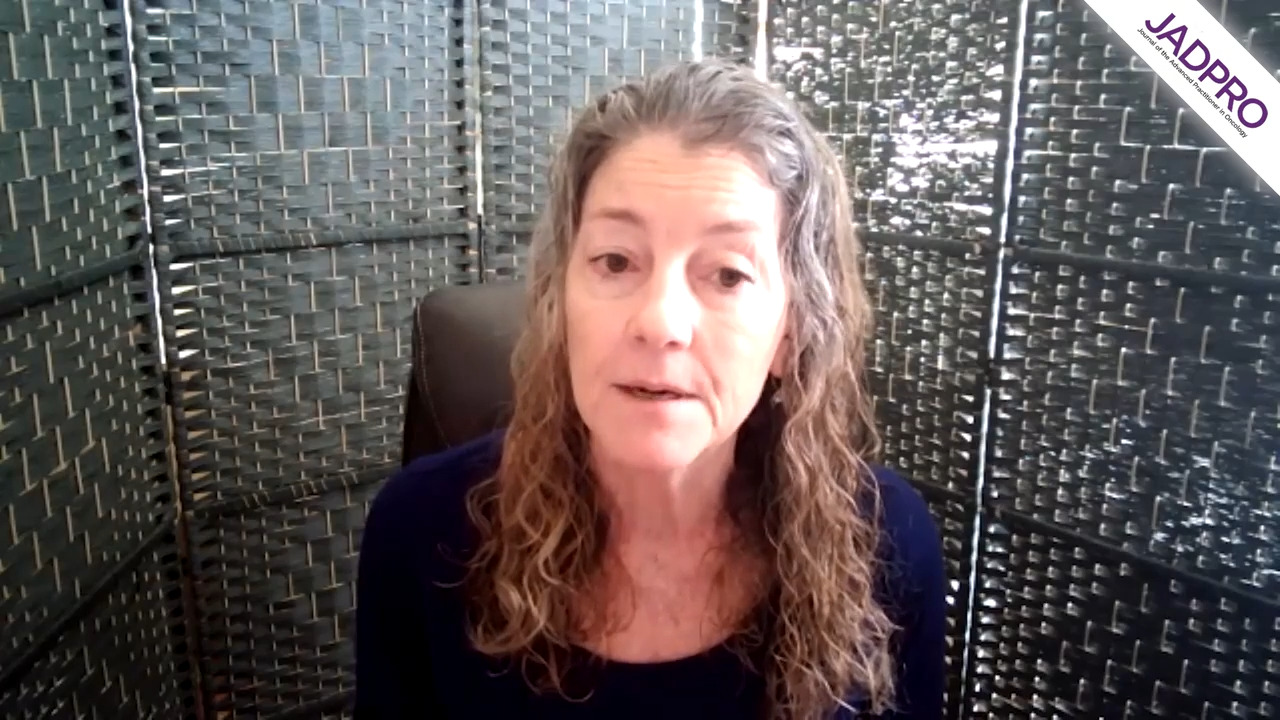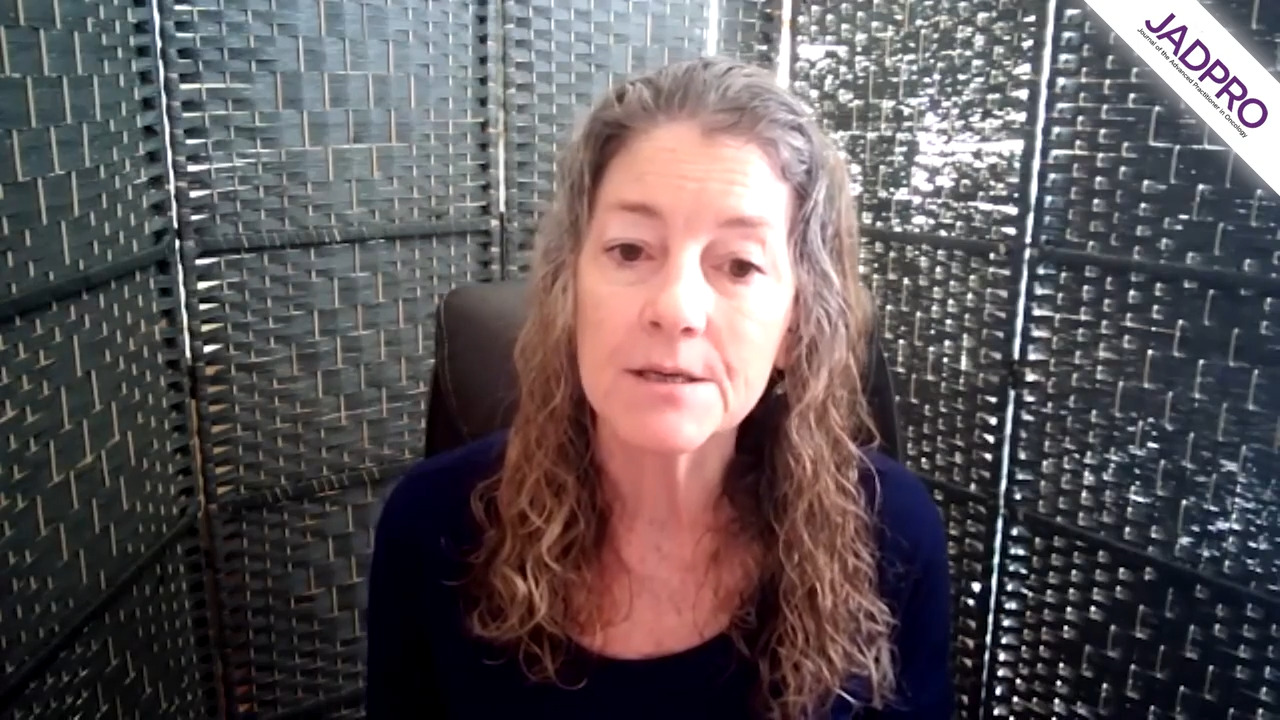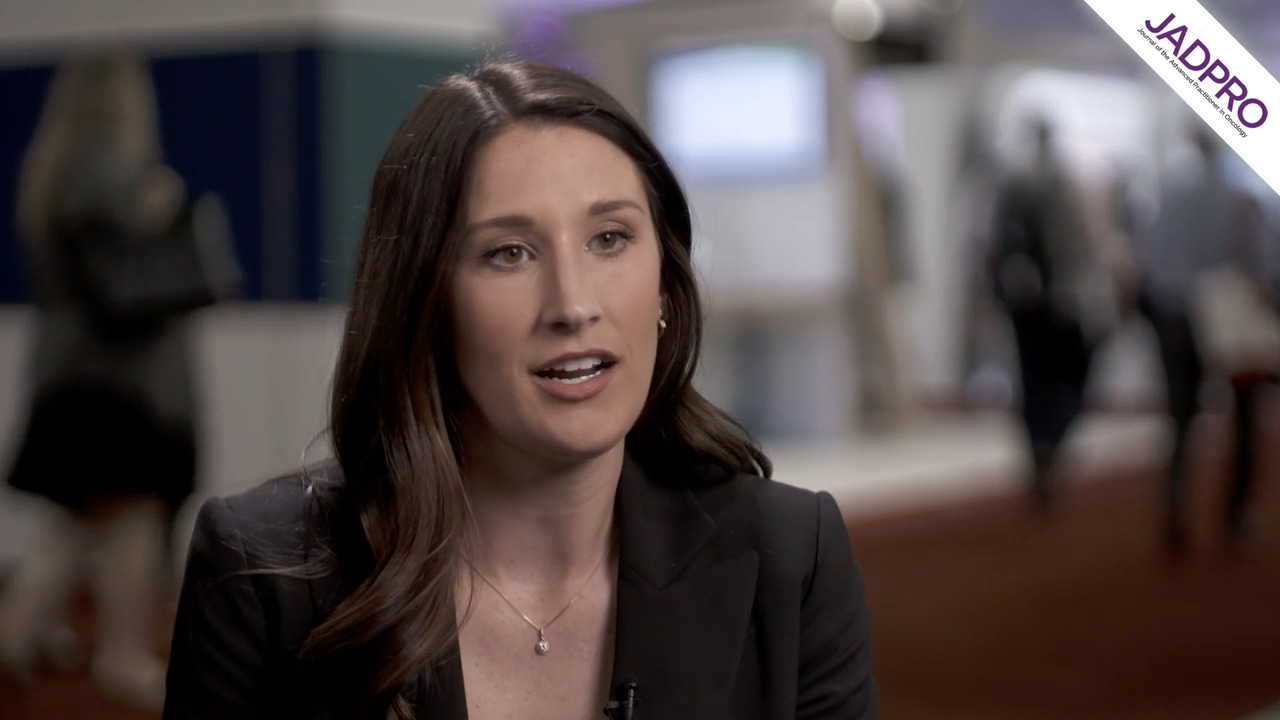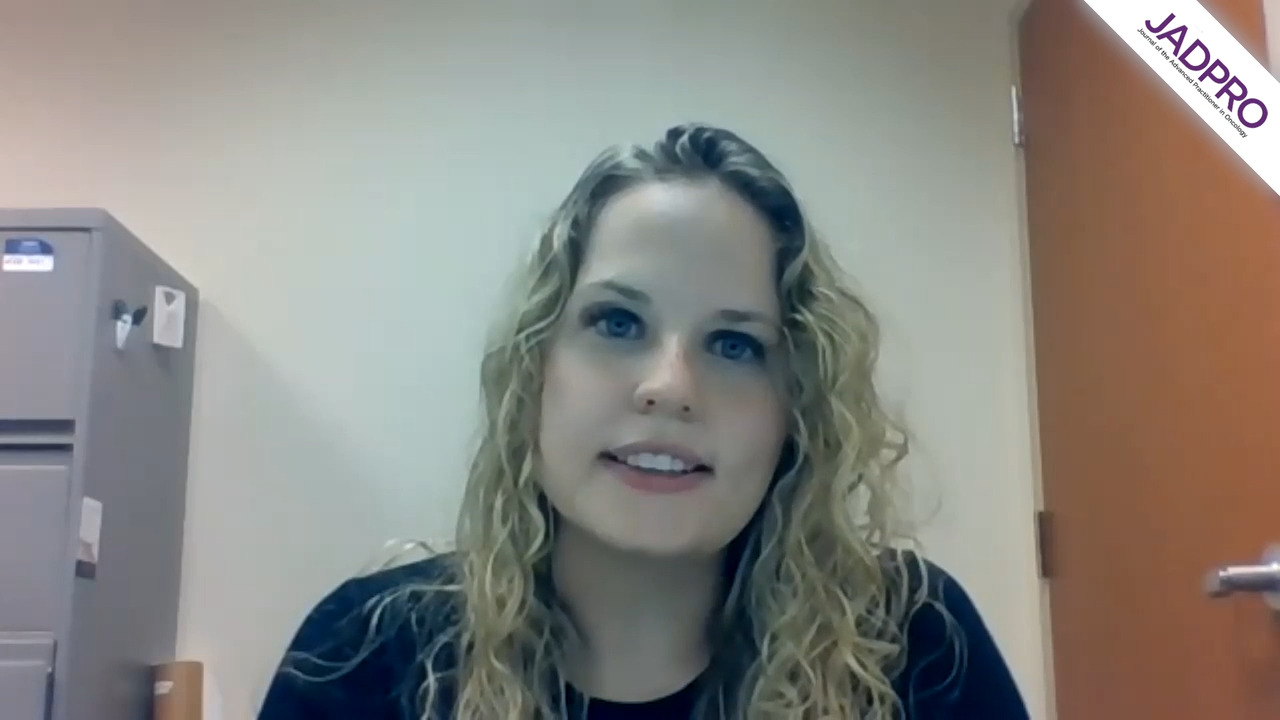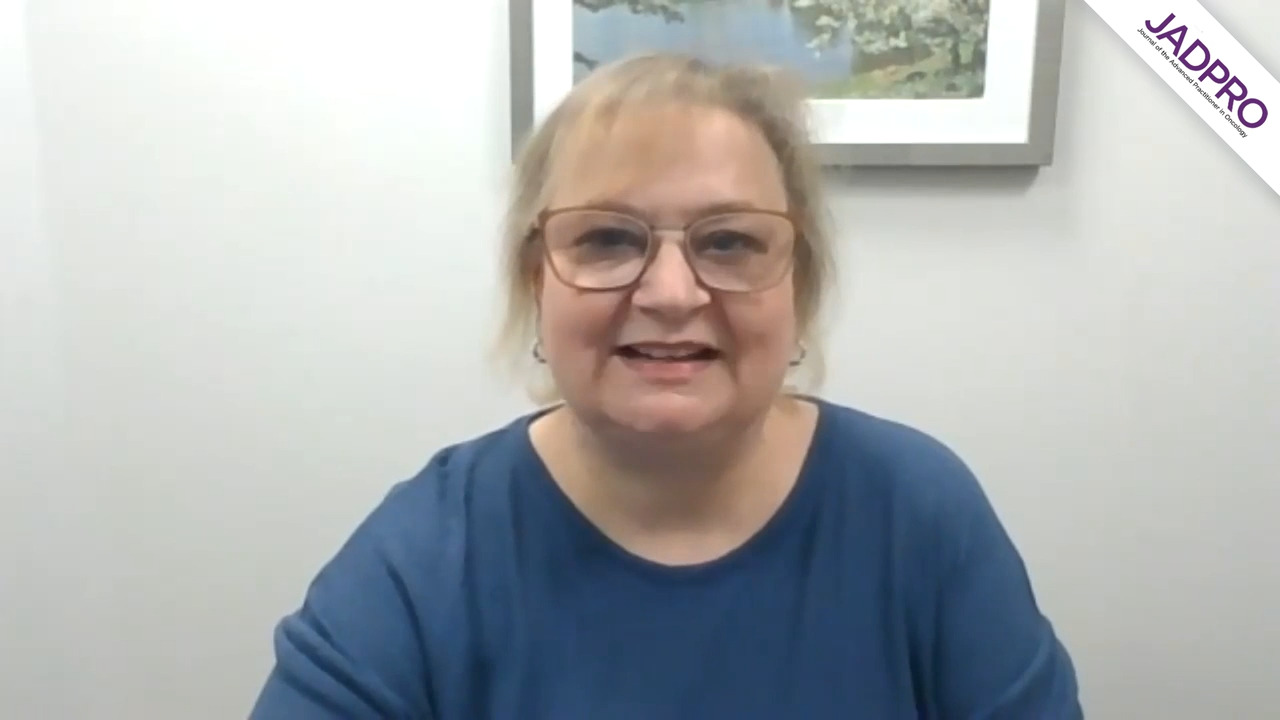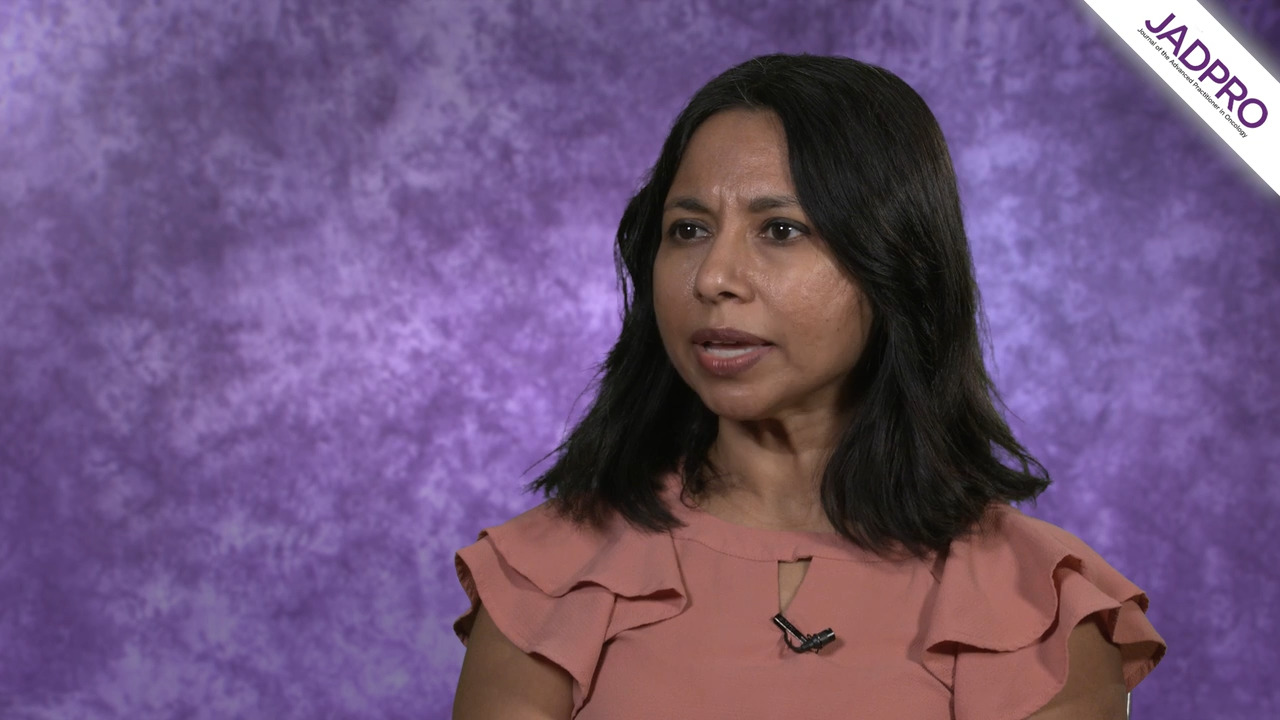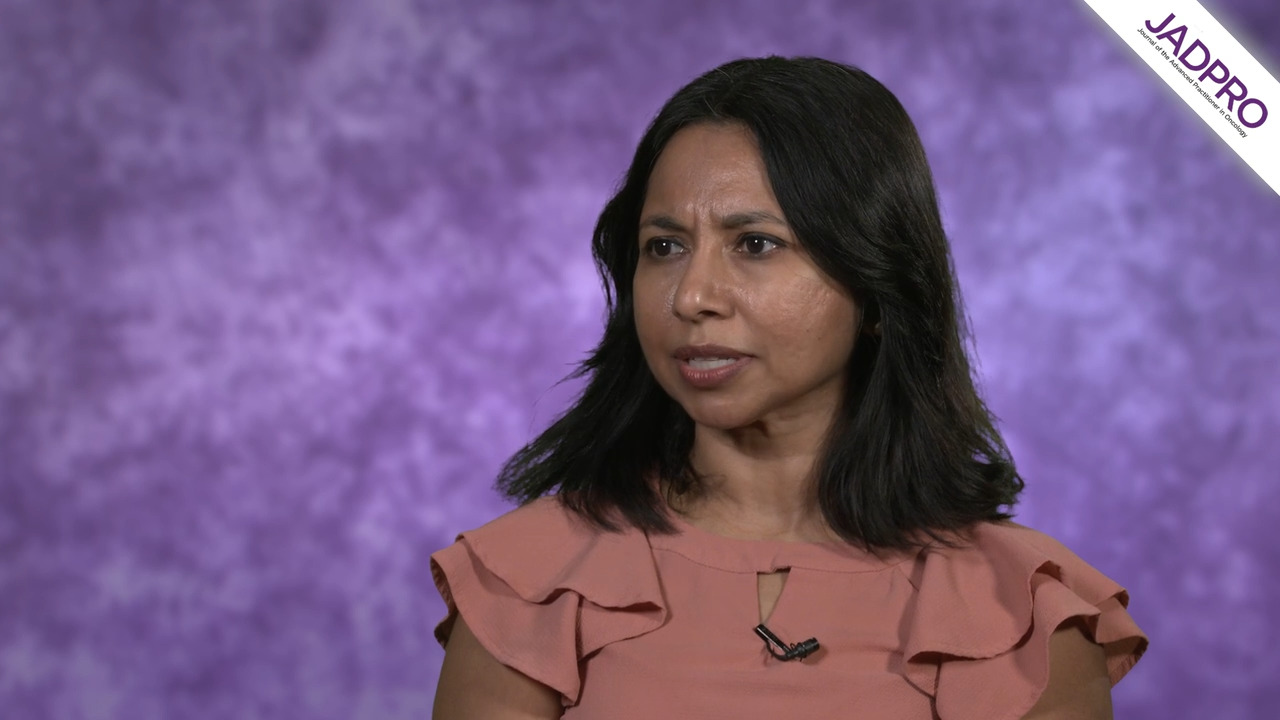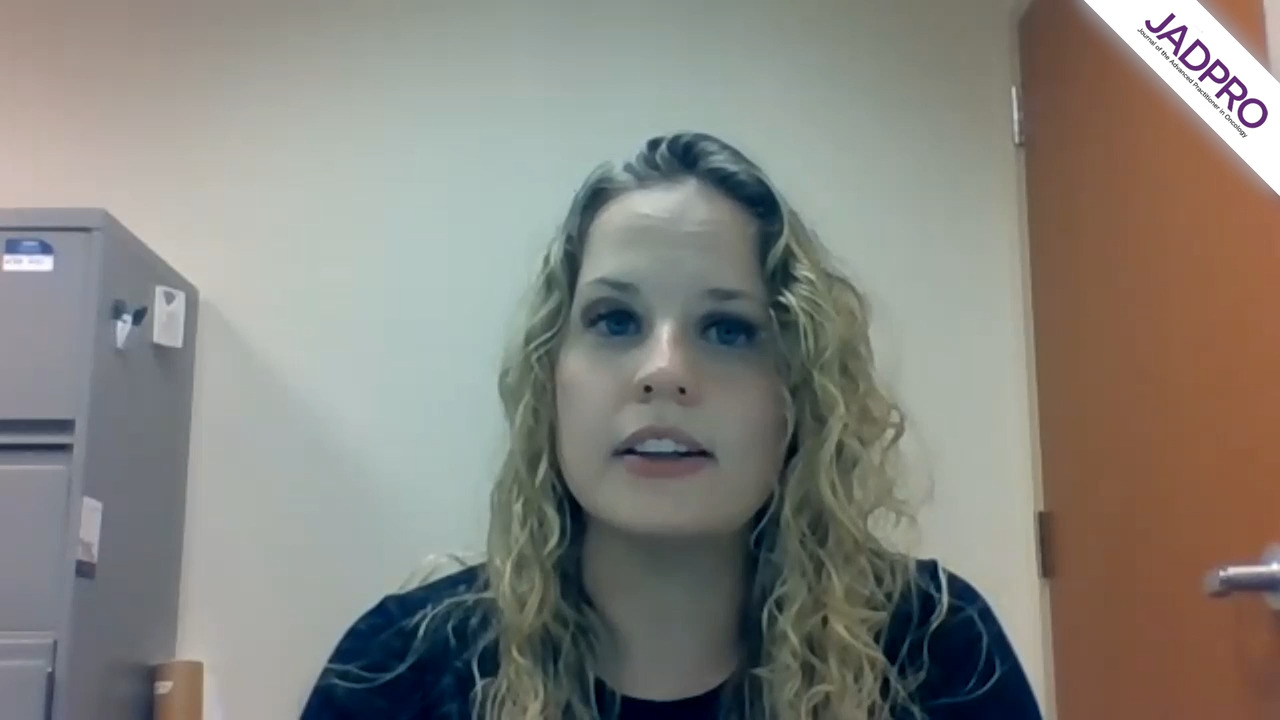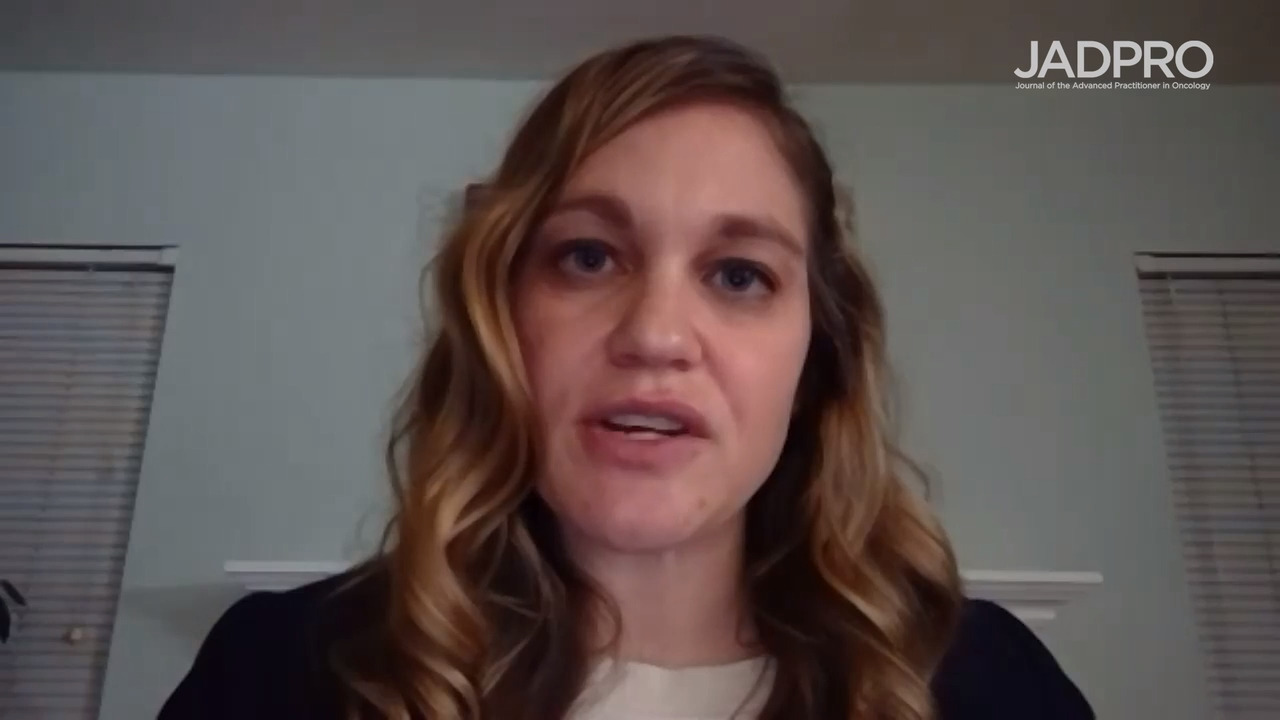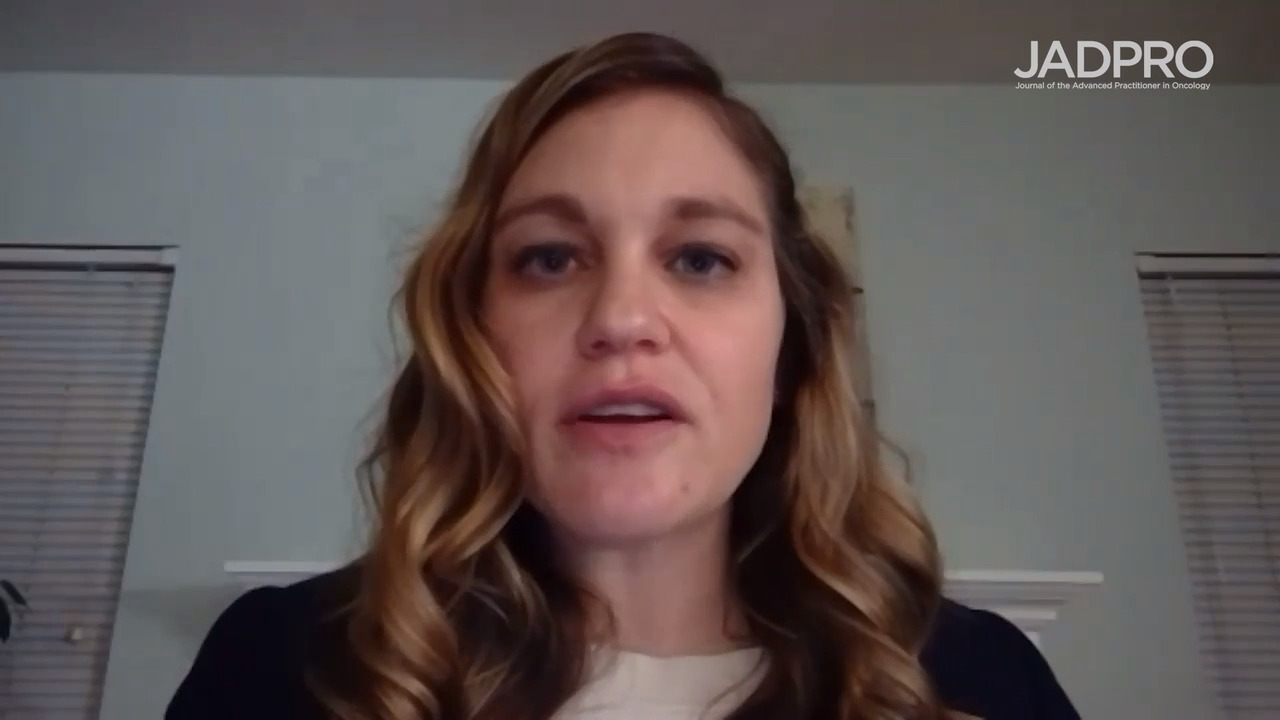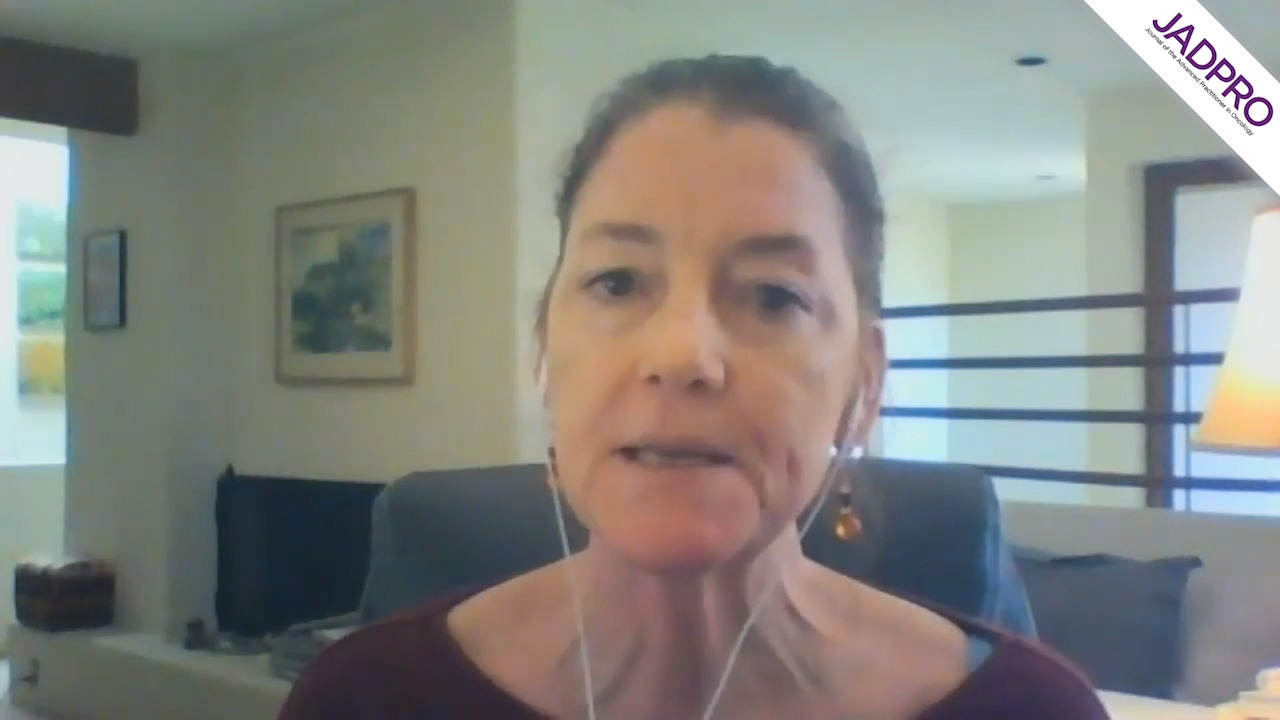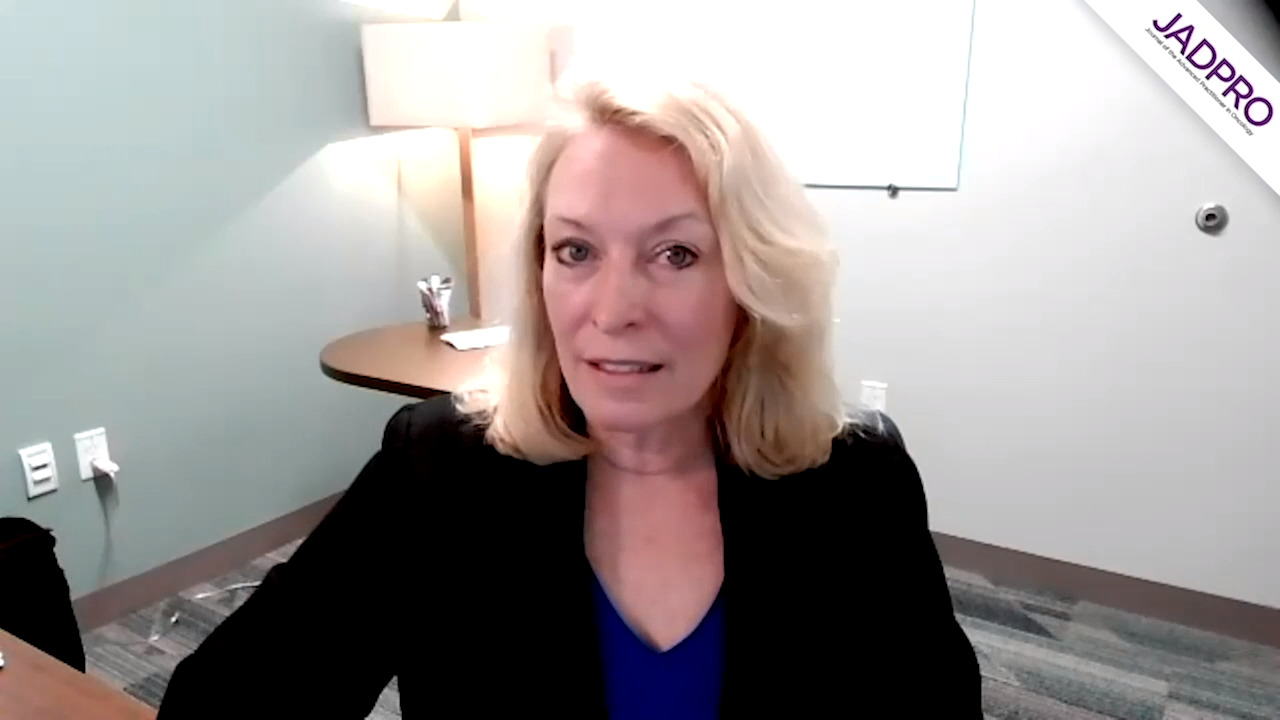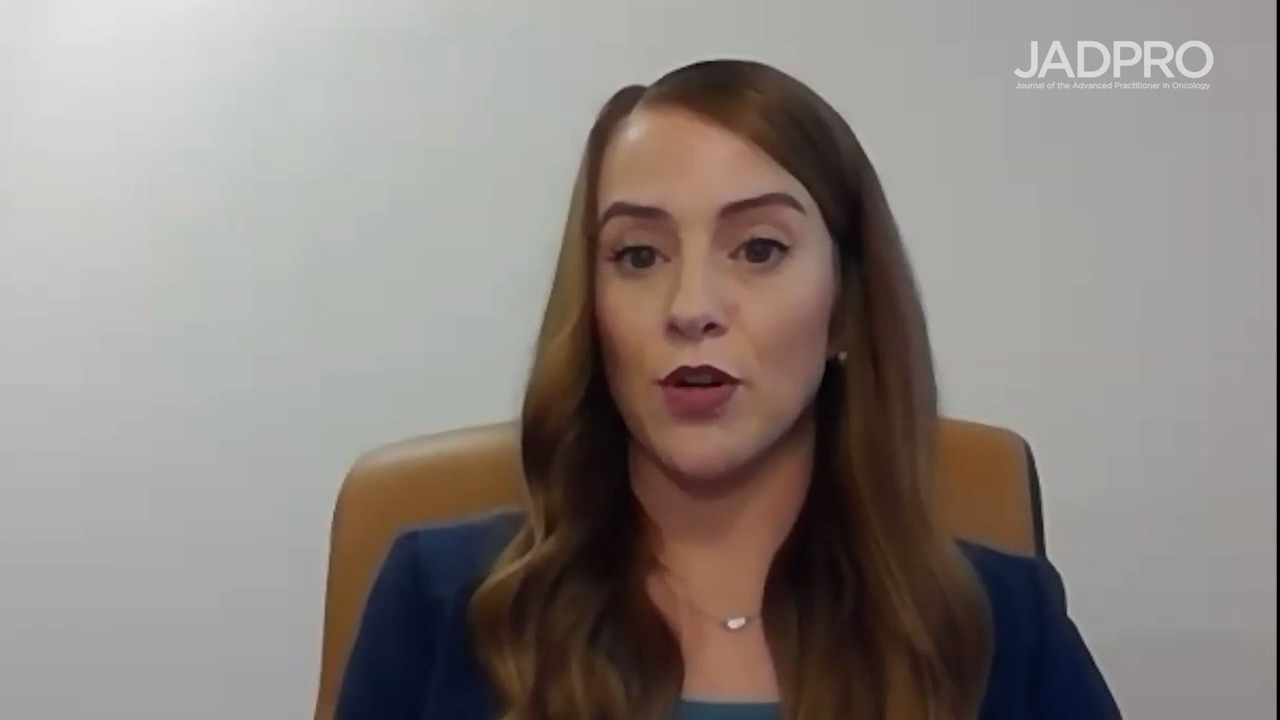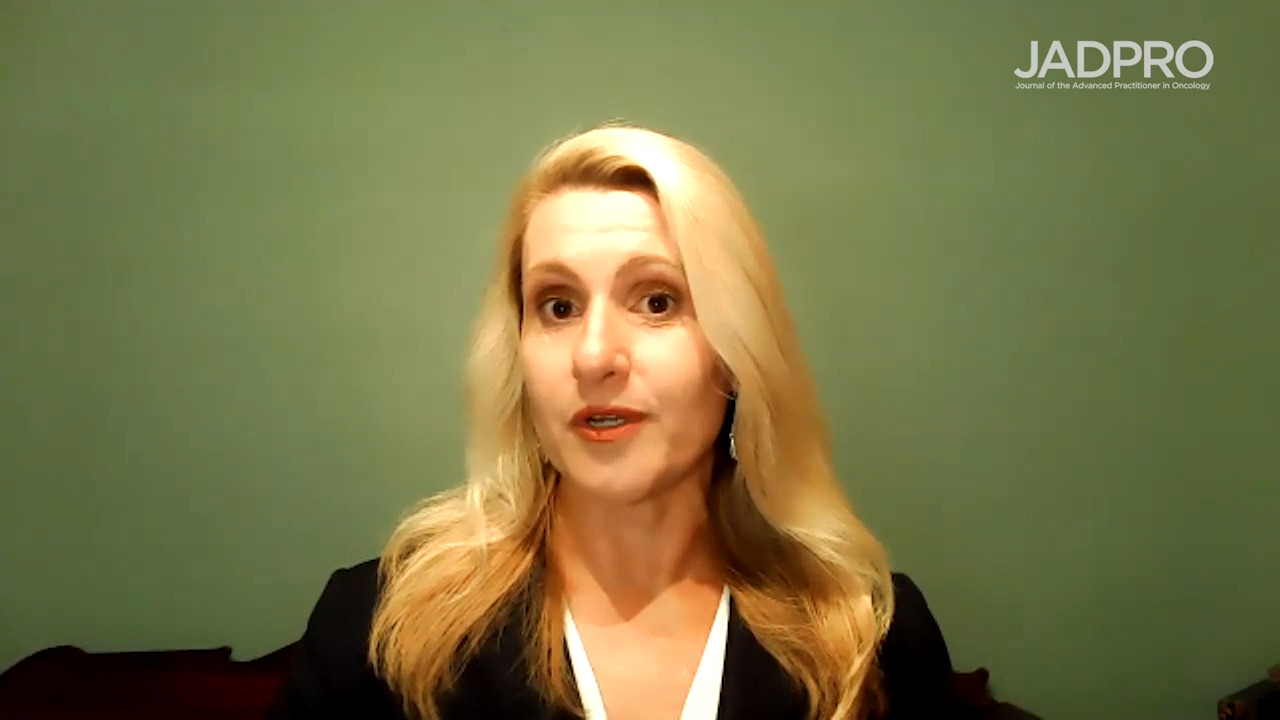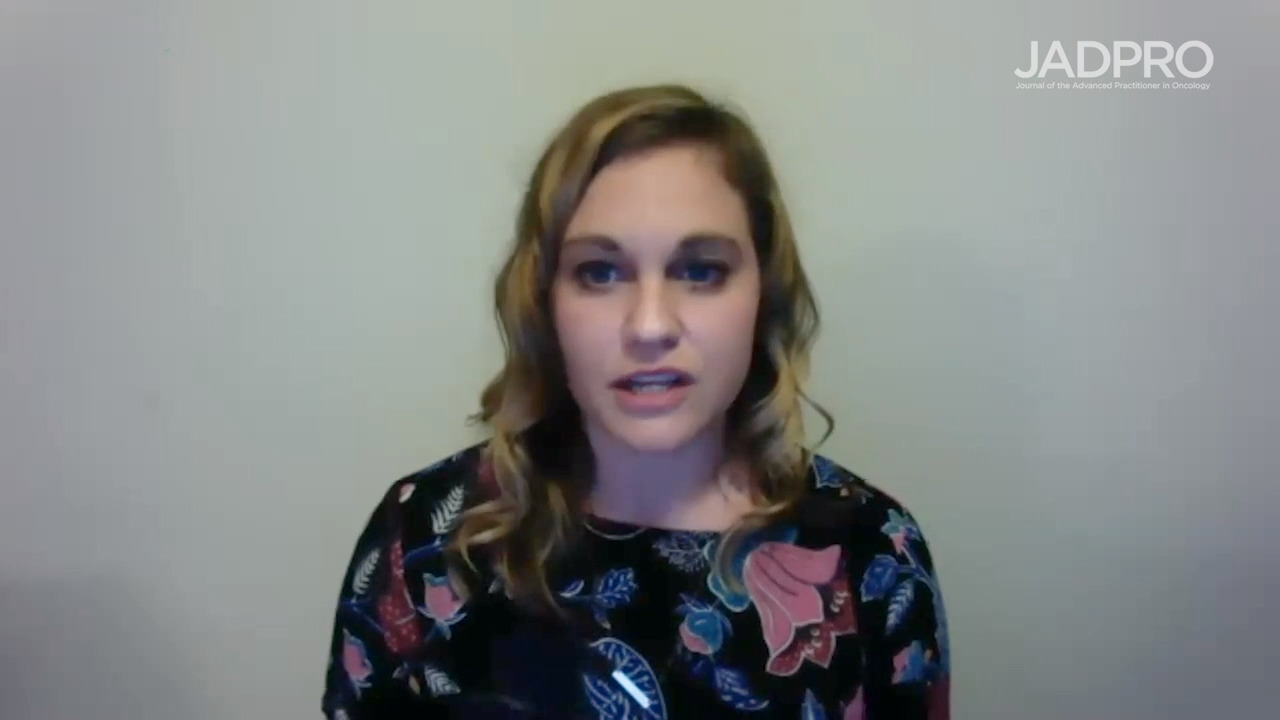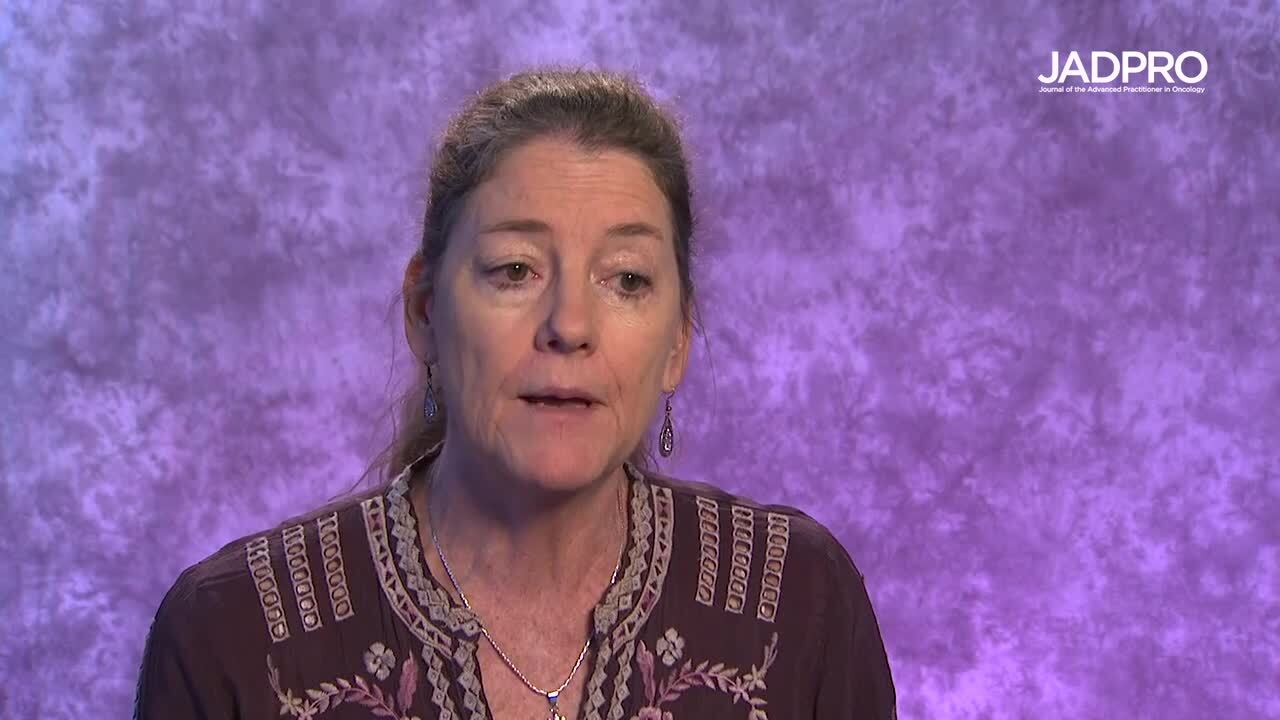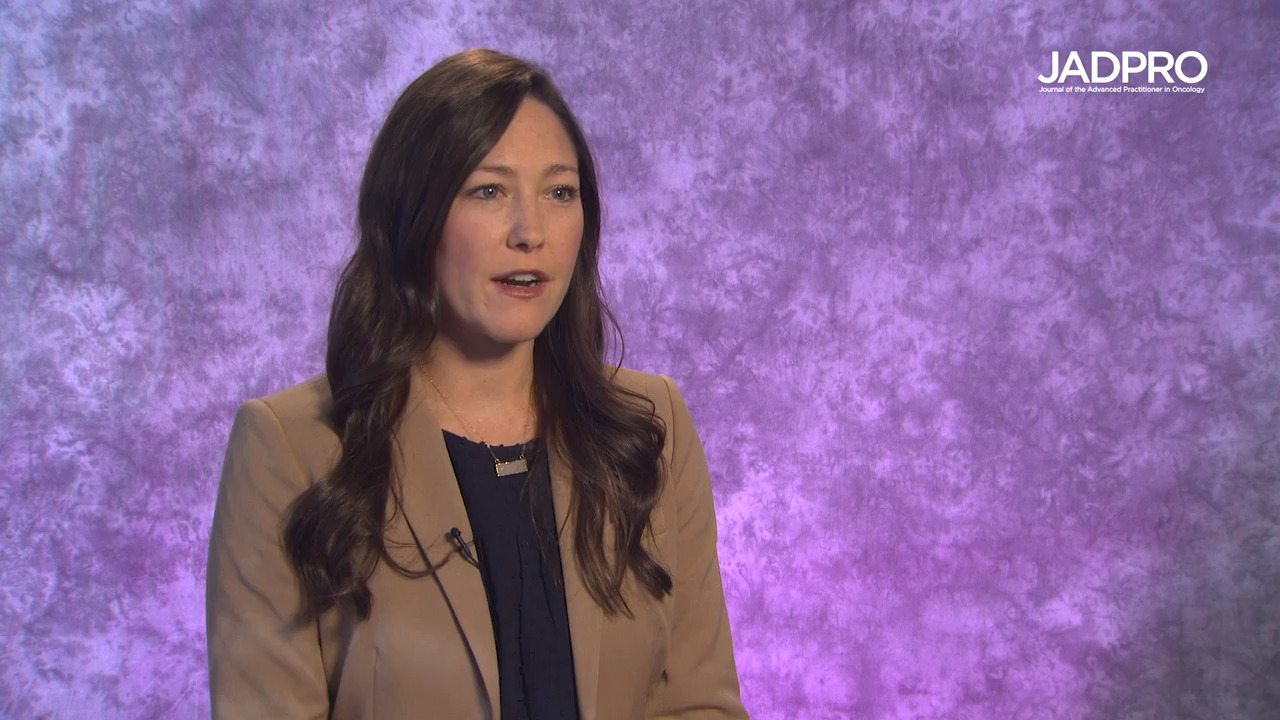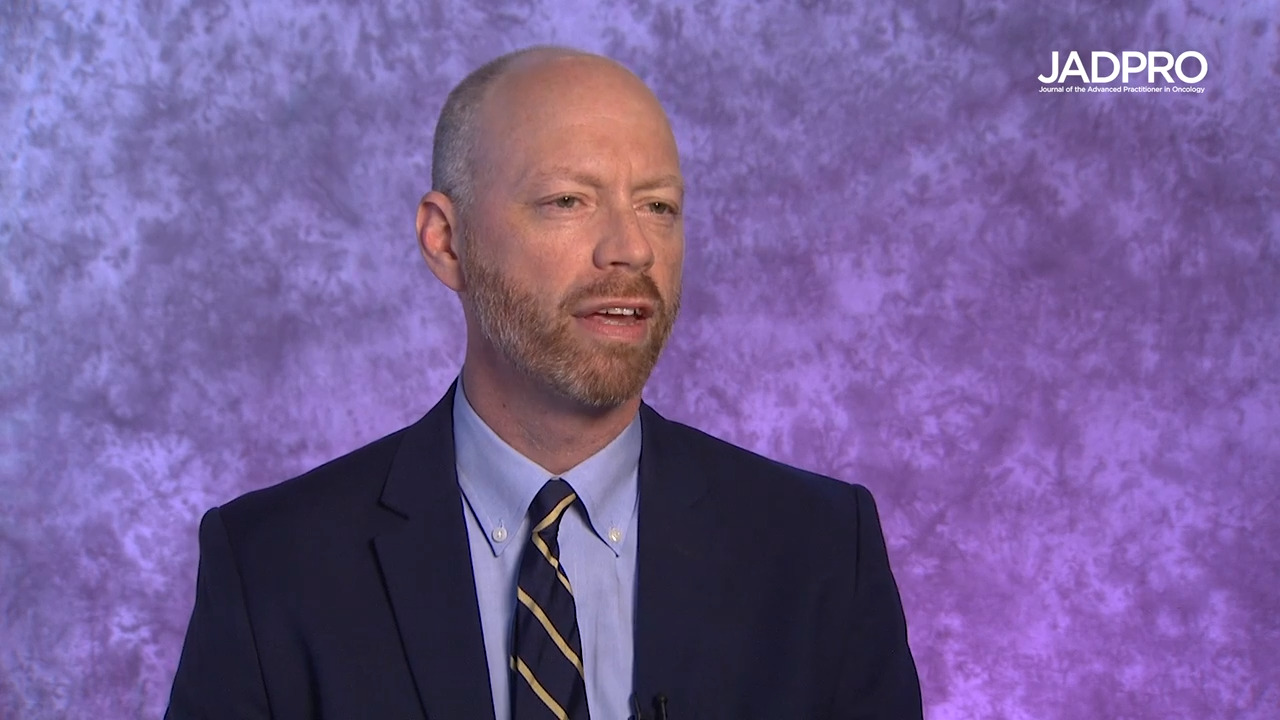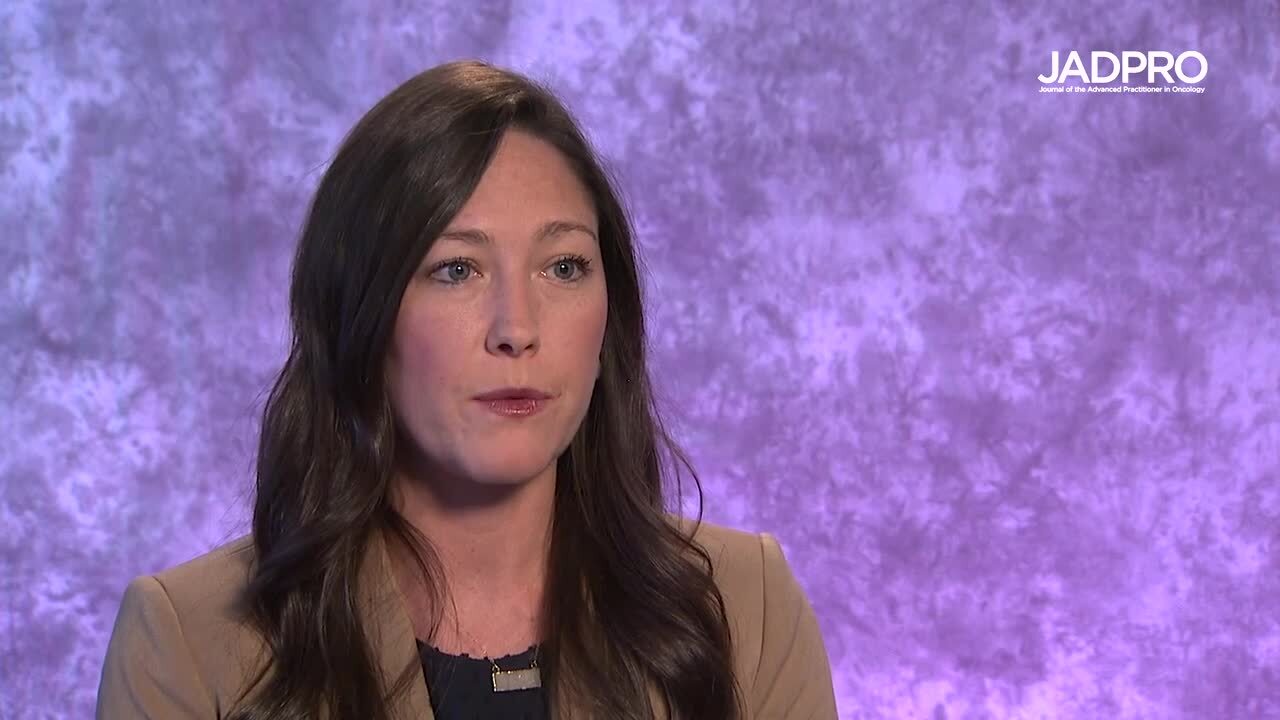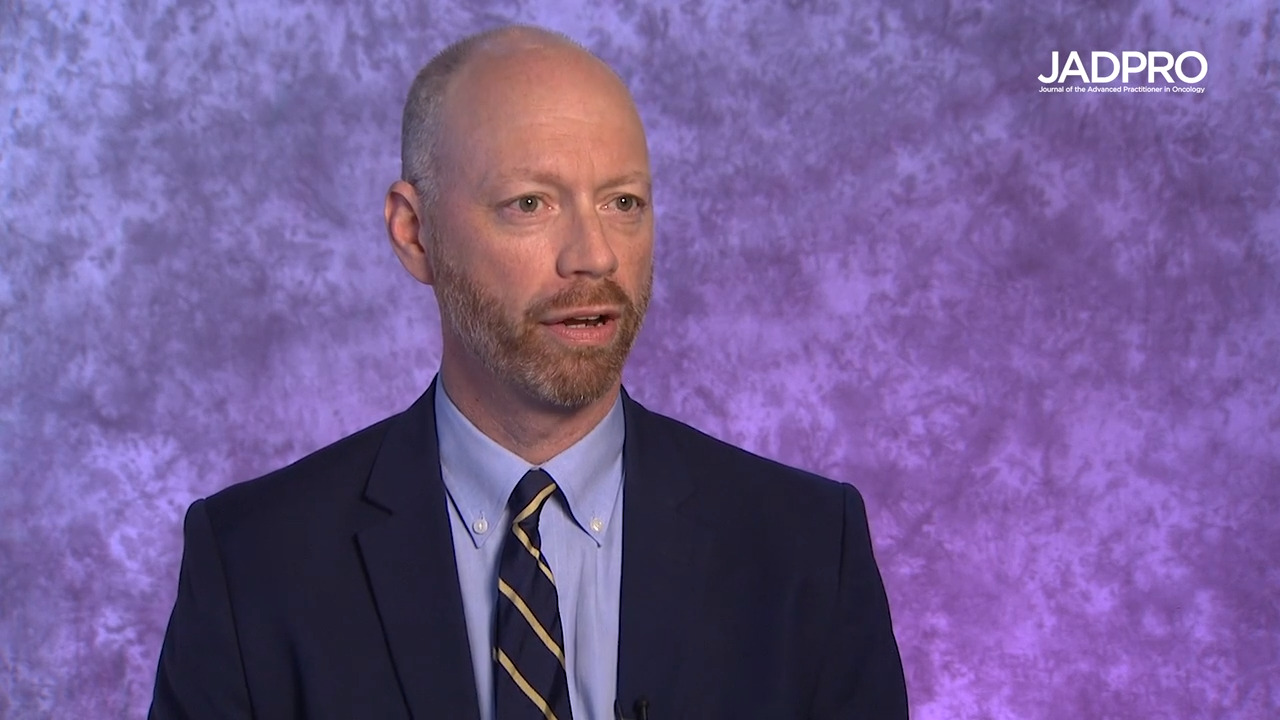Meeting Highlights
Get the advanced practice perspective on impactful research presented at leading hematology/oncology conferences.
2023 ASH Annual Meeting & Exposition
Gloria Espinosa, PharmD, MAT, BCOP, on Safety of Quizartinib by Treatment Phase and Age in FLT3-ITD–Positive Acute Myeloid Leukemia
Gloria Espinosa, PharmD, MAT, BCOP, of Thomas Jefferson University Hospital, comments on the safety data of the FLT3 inhibitor quizartinib in patients with FLT3-ITD–positive acute myeloid leukemia. Infections and cytopenias were observed with quizartinib, and patients older than 65 had higher rates of serious treatment-emergent adverse events (Abstract 972).
2023 ASH Annual Meeting & Exposition
Gloria Espinosa, PharmD, MAT, BCOP, on Efficacy and Safety of Revumenib in Patients With Relapsed/Refractory KMT2Ar Acute Leukemia
Gloria Espinosa, PharmD, MAT, BCOP, of Thomas Jefferson University Hospital, discusses efficacy and safety data for the first-in-class menin inhibitor, revumenib, in patients with relapsed/refractory KMT2A-rearranged acute leukemia. The results show clinically meaningful outcomes and the most common treatment-related adverse events to be nausea, differentiation syndrome, and QTc prolongation (LBA-5).
2023 ASH Annual Meeting & Exposition
Tiffany Richards, PhD, ANP-BC, AOCNP, on Responses to a GPRC5D-Targeted CAR T-Cell Therapy for Relapsed/Refractory Multiple Myeloma
Tiffany Richards, PhD, ANP-BC, AOCNP®, of The University of Texas MD Anderson Cancer Center, reviews updated efficacy and safety data for BMS-986393 (CC‑95266), a GPRC5D-targeted autologous chimeric antigen receptor (CAR) T-cell therapy in patients with relapsed/refractory multiple myeloma. This first-in-human study showed a manageable safety profile, along with deep and durable responses, including minimal residual disease negativity (Abstract 219).
2023 ASH Annual Meeting & Exposition
Tiffany Richards, PhD, ANP-BC, AOCNP, on Newly Diagnosed Multiple Myeloma: Findings on DARA + VRd vs. VRd Alone
Tiffany Richards, PhD, ANP-BC, AOCNP®, of The University of Texas MD Anderson Cancer Center, examines daratumumab (DARA) plus bortezomib, lenalidomide, and dexamethasone (VRd) vs. VRd alone in patients with newly diagnosed multiple myeloma who are eligible for autologous stem cell transplant. DARA plus VRd significantly improved progression-free survival and increased the depth of response (LBA-1).
2023 ASH Annual Meeting & Exposition
Gloria Espinosa, PharmD, MAT, BCOP, on Acute Lymphoblastic Leukemia: Delaying Pegaspargase Administration During Induction
Gloria Espinosa, PharmD, MAT, BCOP, of Thomas Jefferson University Hospital, discusses the delayed administration of pegaspargase for adults with acute lymphoblastic leukemia, which led to a lower rate of high-grade hepatotoxicity and subsequent treatment dose modifications while maintaining a similar response rate (Abstract 4239).
2023 ASH Annual Meeting & Exposition
Tiffany Richards, PhD, ANP-BC, AOCNP, on t(11;14)-Positive Relapsed/Refractory Multiple Myeloma: New Findings on Venetoclax Combination
Tiffany Richards, PhD, ANP-BC, AOCNP®, of The University of Texas MD Anderson Cancer Center, dives into an analysis of minimal residual disease (MRD) negativity from a phase 1/2 trial in t(11;14)-positive relapsed/refractory multiple myeloma. The combination of venetoclax, daratumumab, and dexamethasone showed higher rates of MRD negativity compared with the combination of bortezomib, daratumumab, and dexamethasone (38% vs. 8%; Abstract 338).
2023 ASH Annual Meeting & Exposition
Amber Koehler, MPAS, PA-C, on 3-Year Follow-Up of Mosunetuzumab for Relapsed/Refractory Follicular Lymphoma
Amber Koehler, MPAS, PA-C, of Mayo Clinic discusses an updated analysis of the CD20xCD3 T-cell engaging bispecific antibody, mosunetuzumab, in patients with relapsed/refractory follicular lymphoma and 2 or more prior lines of therapy. After 3 years of follow-up, durable responses continued to be observed with no new cytokine release syndrome events or serious adverse events reported since the previous analysis (Abstract 603).
2023 ASH Annual Meeting & Exposition
Amber Koehler, MPAS, PA-C, on Patient-Reported Quality of Life in the Largest Longitudinal Study of CLL Survivors
Amber Koehler, MPAS, PA-C, of Mayo Clinic, summarizes key points from an abstract she presented at the ASH Annual Meeting. This study, which spanned over 18 years, examined how initial management strategy (watch and wait vs. treatment) at diagnosis impacted patient-reported outcomes in CLL survivors, and how these outcomes differed between the eras of chemoimmunotherapy and targeted agents (Abstract 498).
2023 ASH Annual Meeting & Exposition
Amber Koehler, MPAS, PA-C, on Tolerability and Progression-Free Survival of Nivolumab-AVD in Advanced Stage Hodgkin Lymphoma
Amber Koehler, MPAS, PA-C, of Mayo Clinic, reports on the favorable outcomes and better tolerability of nivolumab (N) with doxorubicin, vinblastine, and dacarbazine (AVD) compared with brentuximab vedotin (BV) with AVD in patients with newly diagnosed advanced stage Hodgkin Lymphoma (Abstract 181).
2023 ASCO Annual Meeting
Racial Disparities in Cancer Mortality in Patients With GI Malignancies Following Medicaid Expansion
Andrew S. Guinigundo, MSN, RN, CNP, ANP-BC, of Cincinnati Cancer Advisors, discusses a study that aimed to investigate the effect of Medicaid expansion on racial disparities in mortality among patients with gastrointestinal malignancies. A total of 86,052 patients were included for analysis. Medicaid expansion was associated with a greater reduction in 2-year mortality rates for Black patients residing in Medicaid expansion states (MES) than for those in non-MES. Existing racial disparities in mortality remained the same or worsened in non-MES but in almost all cases were mitigated in MES following Medicaid expansion (Abstract 6546).
2023 ASCO Annual Meeting
Adjuvant Ribociclib Plus Endocrine Therapy in Patients With HR+/HER2− Early Breast Cancer: Phase III Results
Lisa Kottschade, APRN, MSN, CNP, FAPO, of the Mayo Clinic, discusses the NATALEE study, which evaluated adjuvant ribociclib + estrogen therapy (ET) in patients with stage II or III HR+/HER2− early breast cancer (EBC) at risk for recurrence, including those with no nodal involvement (N0). Ribociclib added to standard-of-care ET demonstrated a statistically significant, clinically meaningful improvement in iDFS with a well-tolerated safety profile. The NATALEE results support ribociclib + ET as the treatment of choice in a broad population of patients with stage II or III HR+/HER2− EBC, including those with N0 disease (Abstract LBA500).
2023 ASCO Annual Meeting
Phase II Results of MonumenTAL-1: Talquetamab for Relapsed/Refractory Multiple Myeloma
2023 ASCO Annual Meeting
Durvalumab With Paclitaxel/Carboplatin and Bevacizumab, Followed by Maintenance Durvalumab, Bevacizumab, and Olaparib in Patients With Newly Diagnosed Advanced Ovarian Cancer Without a Tumor BRCA1/2 Mutation: Phase III Results
Andrew S. Guinigundo, MSN, RN, CNP, ANP-BC, of Cincinnati Cancer Advisors, discusses the phase III DUO-O trial, which evaluates paclitaxel/carboplatin (PC) followed by maintenance bevacizumab (Arm 1); PC plus bevacizumab plus durvalumab followed by maintenance bevacizumab plus durvalumab (Arm 2); and PC plus bevacizumab plus durvalumab followed by maintenance bevacizumab plus durvalumab plus olaparib (Arm 3) in patients with advanced ovarian cancer without a tumor BRCA1/2 mutation in the first-line setting. The primary endpoint is progression-free survival (Abstract LBA5506).
2023 ASCO Annual Meeting
Adjuvant Osimertinib In Patients With Resected EGFR-Mutated Stage IB-IIIA Non-Small Cell Lung Cancer: Final Overall Survival Analysis
Lisa Kottschade, APRN, MSN, CNP, FAPO, of the Mayo Clinic, discusses the planned final overall survival analysis from the ADAURA trial. This study randomized eligible patients (stage IB, II, or IIIA NSCLC) to osimertinib 80 mg once daily or placebo until disease recurrence, treatment completion, or a discontinuation criterion was met. ADAURA is the first global phase III study to demonstrate a statistically significant DFS and OS benefit with targeted treatment for patients with EGFRm stage IB to IIIA NSCLC (Abstract LBA3).
2023 ASCO Annual Meeting
Subgroup Analysis of Elderly Patients With Diffuse Large B-Cell Lymphoma in the Phase III POLARIX Study
2023 ASCO Annual Meeting
HER2-Expressing Solid Tumors: Efficacy and Safety of Trastuzumab Deruxtecan
Andrew S. Guinigundo, MSN, RN, CNP, ANP-BC, of Cincinnati Cancer Advisors, discusses interim results from the DESTINY-PanTumor02 trial, the first tumor-agnostic global study of fam-trastuzumab deruxtecan-nxki (T-DXd) in a broad range of HER2-expressing solid tumors. This agent showed an encouraging overall response rate, particularly in patients with IHC 3+ expression; durable clinical benefit; and a manageable safety profile in these heavily pretreated patients. T-DXd may be a potential new treatment option for this population (Abstract LBA3000).
2023 ASCO Annual Meeting
New Findings on CLL, COVID-19, and Treatment With Obinutuzumab Plus Venetoclax
2023 ASCO Annual Meeting
High-Risk Resected Melanoma: Survival Results With mRNA-4157 and Pembrolizumab in KEYNOTE-942
Lisa Kottschade, APRN, MSN, CNP, FAPO, of the Mayo Clinic, discusses the use of the mRNA-4157 vaccine in combination with pembrolizumab as adjuvant therapy for resected high-risk melanoma, which prolonged distant metastasis–free survival compared with pembrolizumab alone. These results provide further evidence that a personalized neoantigen approach is potentially beneficial (Abstract LBA9503).
2021 ASH Annual Meeting & Exposition
Lindsey M. Lyle, MS, PA-C, on MDS and Oligoblastic AML: New Data on Eprenetapopt and Azacitidine
Lindsey M. Lyle, MS, PA-C, of the University of Colorado Anschutz Medical Campus, discusses findings from a long-term follow-up of the combination of eprenetapopt and azacitidine in patients with TP53-mutant myelodysplastic syndromes (MDS) and oligoblastic acute myeloid leukemia (AML). This is especially important information for advanced practitioners, given the fact that these gene mutations are found in up to 20% of patients with MDS or AML and 30% to 40% of treatment-related MDS/AML cases, representing a distinct molecular cohort with poor outcomes (Abstract 246).
2021 ASH Annual Meeting & Exposition
Lindsey M. Lyle, MS, PA-C, on Advancing Personalized Care for Patients With Myeloproliferative Neoplasms
Lindsey M. Lyle, MS, PA-C, of the University of Colorado Anschutz Medical Campus, discusses results from a quality improvement initiative in which health-care professionals in two large hospital systems in the United States identified challenges in caring for patients with myeloproliferative neoplasms and learned to enhance their ability to deliver patient-centered care and improve team-based collaboration (Abstract 1911).
2021 ASH Annual Meeting & Exposition
Sandra Kurtin, PhD, ANP-C, AOCN, on a Survey of Chemotherapeutic Prescribing Practices Among Oncology Advanced Practice Providers
Sandra Kurtin, PhD, ANP-C, AOCN, of the University of Arizona Cancer Center, discusses a survey that provided insight into the wide range of advanced practice providers’ chemotherapy prescribing practices throughout the United States and the many discrepancies in privileges (Abstract 1897).
2021 ASH Annual Meeting & Exposition
Sandra Kurtin, PhD, ANP-C, AOCN, on Patient-Provider Communication and the Patient Experience
Sandra Kurtin, PhD, ANP-C, AOCN, of the University of Arizona Cancer Center, discusses results from a study that showed patients with lymphoma or chronic lymphocytic leukemia who have taken part in a clinical trial generally are more confident and more involved in their health-care decision-making, reporting having better conversations with their doctors compared to patients who have not participated in a clinical trial (Abstract 3047).
2021 ASH Annual Meeting & Exposition
Lindsey M. Lyle, MS, PA-C, on Paroxysmal Nocturnal Hemoglobinuria: New Findings on Pegcetacoplan Treatment
Lindsey M. Lyle, MS, PA-C, of the University of Colorado Anschutz Medical Campus, discusses phase III data from the PRINCE study, which showed that patients with paroxysmal nocturnal hemoglobinuria who were naive to complement-inhibitor treatment demonstrated meaningful hematologic and clinical improvements following 26 weeks of treatment with the monoclonal antibody pegcetacoplan (Abstract 606).
2021 ASH Annual Meeting & Exposition
Kathryn Tyler Maples, PharmD, BCOP, on Relapsed/Refractory Multiple Myeloma: Clinical Outcomes After Treatment With Bispecific Antibodies
Kathryn Tyler Maples, PharmD, BCOP, of Winship Cancer Institute of Emory University, discusses data of key importance for advanced practitioners on patients with multiple myeloma who are heavily pretreated and predominantly triple-class refractory, and who relapse after receiving bispecific antibodies (BiAbs). These patients may still have good outcomes when sequentially treated with other immunologic or T-cell–directed therapeutics such as BiAbs and CAR-T cells (Abstract 821).
2021 ASH Annual Meeting & Exposition
Kathryn Tyler Maples, PharmD, BCOP, on Elranatamab for Patients With Relapsed or Refractory Multiple Myeloma
Kathryn Tyler Maples, PharmD, BCOP, of Winship Cancer Institute of Emory University, discusses findings from the MagnetisMM-1 trial on elranatamab, a humanized bispecific molecule that targets BCMA expressed in multiple myeloma and engages CD3 on T cells. The results, of interest to advanced practitioners, support continued development of elranatamab as a single agent and in combination with standard treatments for patients with relapsed or refractory multiple myeloma (Abstract 895).
2021 ASH Annual Meeting & Exposition
Kathryn Tyler Maples, PharmD, BCOP, on Multiple Myeloma Treatment With Teclistamab: Early Results on Safety and Efficacy
Kathryn Tyler Maples, PharmD, BCOP, of Winship Cancer Institute of Emory University, discusses phase I/II findings from the MajesTEC-1 trial, which seems to confirm that teclistamab monotherapy induces deep and durable responses in heavily pretreated patients with relapsed or refractory multiple myeloma. Of note for advanced practitioners, this agent is a T-cell–redirecting, bispecific IgG4 antibody that targets both B-cell maturation antigen (BCMA) and CD3 receptors to induce the T-cell–mediated cytotoxicity of BCMA-expressing myeloma cells (Abstract 896).
2021 ASH Annual Meeting & Exposition
Sandra Kurtin, PhD, ANP-C, AOCN, on Aggressive B-Cell Lymphoma After Failure of Anti-CD19 CAR T-Cell Therapy: Outcomes and Treatment Patterns
Sandra Kurtin, PhD, ANP-C, AOCN, of the University of Arizona Cancer Center, discusses the largest reported analysis to date of patients with aggressive B-cell lymphoma who developed progressive disease after CAR T-cell therapy. This is of special interest to advanced practitioners, since there is little guidance on the optimal treatment approaches for these patients (Abstract 884).
2021 San Antonio Breast Cancer Symposium
Erin Grannan, PharmD, BCOP, on Treating Early-Stage Triple-Negative Breast Cancer With Pembrolizumab and Chemotherapy
Erin Grannan, PharmD, BCOP, of The University of Texas MD Anderson Cancer Center, discusses the KEYNOTE-522 trial and new phase III findings of interest to advanced practitioners. In the study, researchers found a generally consistent event-free survival benefit among patients with early-stage high-risk triple-negative breast cancer who were treated with neoadjuvant pembrolizumab plus chemotherapy followed by adjuvant pembrolizumab (Abstract GS1-01).
2021 San Antonio Breast Cancer Symposium
Sheeba Cantanelli, MPAS, PA-C, on Pembrolizumab Plus Chemotherapy for Previously Untreated, Locally Recurrent, Inoperable or Metastatic Triple-Negative Breast Cancer
Sheeba Cantanelli, MPAS, PA-C, of UT Southwestern Simmons Cancer Center, discusses the final phase III results of KEYNOTE-355, which advanced practitioners need to be aware of. The study showed that pembrolizumab and chemotherapy improved overall and progression-free survival, compared with placebo and chemotherapy, for patients with previously untreated, locally recurrent, inoperable or metastatic triple-negative breast cancer (Abstract GS1-02).
2021 San Antonio Breast Cancer Symposium
Donna Kinzler, DNP, ACNP-BC, AOCNP, on HR+/HER2– Early Breast Cancer and Palbociclib Treatment
Donna Kinzler, DNP, ACNP-BC, AOCNP, of the Allegheny Health Network Cancer Institute, discusses phase III findings from the PALLAS study of interest to advanced practitioners. The trial showed that adding 2 years of palbociclib to ongoing adjuvant endocrine therapy did not improve survival for patients with stage II to III hormone receptor–positive and HER2-negative early breast cancer (Abstract GS1-07).
2021 San Antonio Breast Cancer Symposium
Donna Kinzler, DNP, ACNP-BC, AOCNP, on Metastatic Breast Cancer: Margetuximab, Chemotherapy, and Trastuzumab
Donna Kinzler, DNP, ACNP-BC, AOCNP, of the Allegheny Health Network Cancer Institute, discusses the SOPHIA study, which APs need to be aware for their practice. The phase III trial compared margetuximab-cmkb plus chemotherapy (CTX) vs trastuzumab plus CTX in patients with HER2-positive metastatic breast cancer after prior anti-HER2 therapies (Abstract PD8-01).
2021 San Antonio Breast Cancer Symposium
Sheeba Cantanelli, MPAS, PA-C, on HR-Positive Advanced Breast Cancer: New Findings on Entinostat and Exemestane
Sheeba Cantanelli, MPAS, PA-C, of UT Southwestern Simmons Cancer Center, discusses phase III results of a study which showed that when entinostat, an orally bioavailable HDAC inhibitor, is combined with exemestane, it can improve progression-free survival compared with exemestane alone in patients with advanced hormone receptor–positive, HER2- negative breast cancer that progressed after previous endocrine therapy. This regimen may benefit these patients with an unmet medical need (Abstract GS1-06).
2021 San Antonio Breast Cancer Symposium
Erin Grannan, PharmD, BCOP, on HER2-Positive Metastatic Breast Cancer, Trastuzumab Deruxtecan, and Trastuzumab Emtansine
Erin Grannan, PharmD, BCOP, of The University of Texas MD Anderson Cancer Center, discusses the phase III DESTINY-Breast03 trial, which compared ado-trastuzumab deruxtecan (T-DXd) with standard-of-care trastuzumab emtansine (T-DM1) in patients with HER2-positive metastatic breast cancer. Of note, T-DXd demonstrated superior progression-free survival across subgroups of patients previously treated with trastuzumab and a taxane, including those with brain metastases (Abstract GS3-01).
2021 San Antonio Breast Cancer Symposium
Sheeba Cantanelli, MPAS, PA-C, on Metformin and Adjuvant Breast Cancer Outcomes
Sheeba Cantanelli, MPAS, PA-C, of UT Southwestern Simmons Cancer Center, discusses phase III findings that showed metformin, which has been linked to beneficial anticancer effects in some research, did not improve invasive disease–free survival or other outcomes in patients with estrogen or progesterone receptor–positive or –negative breast cancer. The study authors concluded that this agent should not be used as adjuvant treatment (Abstract GS1-08).
2021 San Antonio Breast Cancer Symposium
Donna Kinzler, DNP, ACNP-BC, AOCNP, on Mechanisms of Resistance to Anti-HER2 Therapy for Metastatic Breast Cancer
Donna Kinzler, DNP, ACNP-BC, AOCNP, of the Allegheny Health Network Cancer Institute, discusses a genomic analysis of 733 HER2-positive breast cancers, which identified recurrent pathway alterations associated with anti-HER2 resistance and new therapeutic vulnerabilities. The findings may help clinicians identify selective strategies to prevent disease progression (Abstract GS3-03).
2021 San Antonio Breast Cancer Symposium
Erin Grannan, PharmD, BCOP, on Triple-Negative and Metastatic Breast Cancers: New Treatment Results on Neratinib, Fulvestrant, and Trastuzumab
Erin Grannan, PharmD, BCOP, of The University of Texas MD Anderson Cancer Center, discusses the latest updates from the SUMMIT trial that advanced practitioners need to be aware of. Researchers explored the promising combinations of neratinib plus fulvestrant plus trastuzumab, neratinib plus trastuzumab, as well as fulvestrant alone. The combination regimens appeared to benefit patients with hormone–receptor positive HER2-mutated metastatic breast cancer who have had prior exposure to CDK4/6 inhibitors, and those with HER2-mutated triple-negative disease (Abstract GS4-10).
SOHO 2021 Annual Meeting
Alexis C. Geppner, MLS, CTTS, PA-C, on ALL and Hyper C-VAD: Lessons Learned and New Approaches
Alexis C. Geppner, MLS, CTTS, PA-C, of The University of Texas MD Anderson Cancer Center, discusses key data that advanced practitioners need to know about treatment for patients with acute lymphocytic leukemia, the shift away from intensive chemotherapy with the use of monoclonal antibodies and tyrosine kinase inhibitors, and whether overall responses and survival can be maintained or improved.
SOHO 2021 Annual Meeting
Alexis C. Geppner, MLS, CTTS, PA-C, on IDH-Mutated AML: Beyond Enasidenib and Ivosidenib Monotherapy
Alexis C. Geppner, MLS, CTTS, PA-C, of The University of Texas MD Anderson Cancer Center, discusses important updates that advanced practitioners need to be aware of when treating patients with acute myeloid leukemia, including two key driver mutations (IDH1 and IDH2), the inhibitors ivosidenib and enasidenib, lower-intensity chemotherapy combinations, and the role of venetoclax and azacitidine.
SOHO 2021 Annual Meeting
Alexis C. Geppner, MLS, CTTS, PA-C, on Targeting p53 in MDS
Alexis C. Geppner, MLS, CTTS, PA-C, of The University of Texas MD Anderson Cancer Center, discusses key information for advanced practitioners on the impact of TP53 mutations on prognosis in myelodysplastic syndrome, the implications of serial TP53 analyses, and novel therapeutic strategies for treating patients with TP53-mutant disease.
SOHO 2021 Annual Meeting
Lisa Nodzon, PhD, ARNP, AOCNP, on Myelofibrosis: New Therapeutic Approaches
Lisa Nodzon, PhD, ARNP, AOCNP, of the H. Lee Moffitt Cancer Center & Research Institute, discusses potential new treatment strategies for patients with myelofibrosis that advanced practitioners should be aware of, including anemia therapy in combination with a JAK inhibitor, first-line combination treatments, new second-line therapies, and strategies for patients with very low platelets.
SOHO 2021 Annual Meeting
Lisa Nodzon, PhD, ARNP, AOCNP, on Richter Syndrome: Therapeutic Strategies
Lisa Nodzon, PhD, ARNP, AOCNP, of the H. Lee Moffitt Cancer Center & Research Institute, discusses an update on treating Richter Syndrome, including information on clonally related vs unrelated variants of the disease; the role of venetoclax, acalabrutinib, pirtobrutinib, and DA-EPOCH-VR chemotherapy; and the use of immune checkpoint inhibitors and CAR T-cell therapy; as well as a number of ongoing clinical trials on combinations of various targeted agents.
SOHO 2021 Annual Meeting
Lisa Nodzon, PhD, ARNP, AOCNP, on BCMA-Directed CAR-T Cells: Early Results and Future Directions
Lisa Nodzon, PhD, ARNP, AOCNP, of the H. Lee Moffitt Cancer Center & Research Institute, discusses key information for advanced practitioners on the B-cell maturation antigen, a target for multiple myeloma, and CAR T-cell therapy, now approved for relapsed or refractory disease. Although the results have been encouraging, relapses still occur, highlighting the need to understand how best to sequence the regimen and the role of antibody-drug conjugates, bispecific antibodies, and CAR-T cells.
SOHO 2021 Annual Meeting
Kelly Valla, PharmD, BCOP, on T-Cell Lymphoma: Immunotherapy Approaches
Kelly Valla, PharmD, BCOP, of Winship Cancer Institute of Emory University, discusses updates on CAR T-cell therapy and what advanced practitioners need to be aware of when treating patients with rare lymphomas: how best to sequence these agents; the potential acute and long-term toxicities; available clinical trials; and appropriate referral to centers, especially for those who may not have many viable treatment options.
SOHO 2021 Annual Meeting
Kelly Valla, PharmD, BCOP, on Aggressive B-Cell Lymphoma: The Next Wave of Novel Agents
Kelly Valla, PharmD, BCOP, of Winship Cancer Institute of Emory University, discusses important data that advanced practitioners need to know about bispecific antibodies in the pipeline such as mosunetuzumab, glofitamab, and epcoritamab and how they may fit into the treatment paradigm; new antibody-drug conjugates; and how to sequence the agents, manage their toxicities, and deliver supportive care.
SOHO 2021 Annual Meeting
Kelly Valla, PharmD, BCOP, on Relapsed/Refractory MCL: Novel Treatment Approaches
Kelly Valla, PharmD, BCOP, of Winship Cancer Institute of Emory University, discusses mantle cell lymphoma and what advanced practitioners should know about improving outcomes in relapsed and refractory disease with BTK inhibitors such as treatment with pirobrutinib; other new agents such as parsaclisib, a PI3K delta inhibitor, and the bispecific agent epcoritamab; and CAR T-cell therapy. She also relays some clinical pearls on toxicity management (including financial toxicity) and supportive care.
2020 ASH Annual Meeting
Beth Faiman, PhD, MSN, APRN-BC, AOCN, FAAN, on Daratumumab, Pomalidomide, and Dexamethasone for Multiple Myeloma Treatment
Beth Faiman, PhD, MSN, APRN-BC, AOCN, FAAN, of the Taussig Cancer Institute, Cleveland Clinic, discusses what advanced practitioners need to know about phase III findings on subcutaneous daratumumab plus pomalidomide and dexamethasone. Compared to pomalidomide and dexamethasone alone, this combination reduced the risk of disease progression or death by 37% for patients with relapsed or refractory multiple myeloma (Abstract 412).
2020 ASH Annual Meeting
Sandra Kurtin, PhD, ANP-C, AOCN, on COVID-19 in Patients With Hematologic Malignancies: High False-Negative Rate With High Mortality
2020 ASH Annual Meeting
Sara Tinsley, PhD, APRN, AOCN, on CLL: Minimal Residual Disease After Venetoclax and Rituximab Therapy
Sara Tinsley, PhD, APRN, AOCN, of Moffitt Cancer Center, discusses what advanced practitioners need to know about the findings of the MURANO study, which analyzed patients with relapsed or refractory chronic lymphocytic leukemia who had enduring undetectable minimal residual disease after receiving fixed-duration treatment with venetoclax and rituximab (Abstract 125).
2020 ASH Annual Meeting
Beth Faiman, PhD, MSN, APRN-BC, AOCN, FAAN, on Multiple Myeloma: Patient-Reported Experiences With Belantamab Mafodotin
Beth Faiman, PhD, MSN, APRN-BC, AOCN, FAAN, of the Taussig Cancer Institute, Cleveland Clinic, discusses key insights for advanced practitioners from the DREAMM-2 study, which detailed the self-reported experiences of patients with relapsed or refractory multiple myeloma who had treatment-related side effects from belantamab mafodotin (Abstract 3248).
2020 ASH Annual Meeting
Sandra Kurtin, PhD, ANP-C, AOCN, on The Burkitt Lymphoma International Prognostic Index
Sandra Kurtin, PhD, ANP-C, AOCN, of The University of Arizona Cancer Center, discusses what advanced practitioners need to know about a novel prognostic index specific to Burkitt lymphoma. The index can identify patients for whom treatment may be de-escalated, as well as patients for whom currently available immunochemotherapy is appropriate (Abstract 705).
2020 ASH Annual Meeting
Sara Tinsley, PhD, APRN, AOCN, on B-Cell Lymphoma: Phase Ib/II Data on ViPOR for Relapsed or Refractory Disease
Sara Tinsley, PhD, APRN, AOCN, of Moffitt Cancer Center, discusses early insights for advanced practitioners on the safety, efficacy, and toxicities of the drug regimen known as ViPOR (venetoclax, ibrutinib, prednisone, obinutuzumab, and lenalidomide) for patients with relapsed or refractory B-cell lymphoma (Abstract 598).
2020 ASH Annual Meeting
Beth Faiman, PhD, MSN, APRN-BC, AOCN, FAAN, on Converting Minimal Residual Disease in Multiple Myeloma
Beth Faiman, PhD, MSN, APRN-BC, AOCN, FAAN, of the Taussig Cancer Institute, Cleveland Clinic, discusses what advanced practitioners need to understand about maintenance treatments with carfilzomib and lenalidomide, and conversion from minimal residual disease–positive to –negative in patients with newly diagnosed transplant-eligible multiple myeloma (Abstract 491).
2020 ASH Annual Meeting
Sandra Kurtin, PhD, ANP-C, AOCN, on Long-Term Side Effects Among Patients With Primary Cold Agglutinin Disease
Sandra Kurtin, PhD, ANP-C, AOCN, of The University of Arizona Cancer Center, discusses the role advanced practitioners can play in managing the unmet medical needs of patients with primary cold agglutinin disease, many of whom had severe anemia, as well as a high number of hemolysis events, requiring blood transfusions as long as 3 years after diagnosis (Abstract 151).
2020 ASH Annual Meeting
Sara Tinsley, PhD, APRN, AOCN, on MDS: Pevonedistat and Azacitidine for Higher-Risk Disease
SOHO 2020 Annual Meeting
Allyson Price, MPAS, PA-C, on Predicting Drug Response in Acute Lymphoblastic Leukemia
Allyson Price, MPAS, PA-C, of The University of Texas MD Anderson Cancer Center, discusses gene drug mapping, the future of precision medicine in leukemia, and the need for advanced practitioners to educate this patient population who may be new to the use of oral medications.
SOHO 2020 Annual Meeting
Allyson Price, MPAS, PA-C, on Immunotherapy for T-Cell ALL and T-NHL
Allyson Price, MPAS, PA-C, of The University of Texas MD Anderson Cancer Center, discusses the Keynote lecture on two complex disease states, the vital role advanced practitioners play in managing patients on CAR-T therapies, and explaining graft-vs-host disease as well as other adverse events to their patients with hematologic malignancies.
SOHO 2020 Annual Meeting
Allyson Price, MPAS, PA-C, on Oral HMAs for Myelodysplastic Syndrome
Allyson Price, MPAS, PA-C, of The University of Texas MD Anderson Cancer Center, discusses oral hypomethylating agents for MDS, and the implications for advanced practitioners helping patients adhere to the new regimens and maintain good quality of life.
SOHO 2020 Annual Meeting
Lisa Nodzon, PhD, ARNP, AOCNP, on Myelofibrosis: New Therapies in Development
Lisa Nodzon, PhD, ARNP, AOCNP, of Moffitt Cancer Center, discusses agents in phase III studies (both ongoing and planned), how the treatment landscape for myelofibrosis is changing, and what advanced practitioners need to know about managing adverse events, drug mechanisms of action, and staying up to date on the pipeline.
SOHO 2020 Annual Meeting
Lisa Nodzon, PhD, ARNP, AOCNP, on Multiple Myeloma: Managing Early Relapse
Lisa Nodzon, PhD, ARNP, AOCNP, of Moffitt Cancer Center, discusses new drug combinations to treat multiple myeloma, the challenges of managing relapsed and refractory disease, and the role that advanced practitioners need to play in educating patients about individualized treatments.
SOHO 2020 Annual Meeting
Lisa Nodzon, PhD, ARNP, AOCNP, on CLL: Measuring Residual Disease
Lisa Nodzon, PhD, ARNP, AOCNP, of Moffitt Cancer Center, discusses the progress made in treating chronic lymphocytic leukemia, the clinical implications of undetectable minimal residual disease in blood and bone marrow, and how advanced practitioners can help patients better understand their disease to weigh their treatment options.
SOHO 2020 Annual Meeting
Kelly Valla, PharmD, BCOP, on Relapsed or Refractory Hodgkin Lymphoma: Integrating Novel Agents
Kelly Valla, PharmD, BCOP, of Winship Cancer Institute of Emory University, discusses what advanced practitioners need to know about integrating brentuximab vedotin and PD-1 blockade earlier in the care of patients with Hodgkin lymphoma, the optimal timing of novel agents as well as new agents showing promise, and combinations that may improve outcomes.
SOHO 2020 Annual Meeting
Kelly Valla, PharmD, BCOP, on Peripheral T-Cell Lymphoma: Managing Relapsed Disease
Kelly Valla, PharmD, BCOP, of Winship Cancer Institute of Emory University, discusses insights for advanced practitioners on the many facets of treating peripheral T-cell lymphoma, including stem cell transplants, single agents vs combination chemotherapies, and disease targets.
SOHO 2020 Annual Meeting
Kelly Valla, PharmD, BCOP, on Cellular Therapy: New CAR Designs
Kelly Valla, PharmD, BCOP, of Winship Cancer Institute of Emory University, discusses next-generation CAR T cells and what advanced practitioners need to understand about enhanced cytotoxicity and increased persistence of the cells, endogenous anti-tumor immunity, and the immunosuppressive tumor microenvironment.
2019 ASH Annual Meeting
Sandra E. Kurtin, PhD, ANP-C, AOCN, on Multiple Myeloma in Older Patients: Isatuximab With Pomalidomide and Dexamethasone
Sandra E. Kurtin, PhD, ANP-C, AOCN, of the University of Arizona Cancer Center, discusses data from the ICARIA-MM trial that show adding isatuximab to pomalidomide and dexamethasone improved progression-free survival, overall survival, overall response rate, and very good partial response rate in older patients (65 years and older) with relapsed/refractory multiple myeloma (Abstract 1893).
2019 ASH Annual Meeting
Amy Pierre, ANP-BC, on CLL in Older Patients: The Alliance Trial on Ibrutinib, Obinutuzumab, and Venetoclax
Amy Pierre, ANP-BC, of Memorial Sloan Kettering Cancer Center, discusses a currently enrolling phase III trial on a new strategy to decrease exposure time to ibrutinib, which has the potential to change the standard of care for patients 70 years or older with previously untreated chronic lymphocytic leukemia (Abstract 1751).
2019 ASH Annual Meeting
Amy Pierre, ANP-BC, on Multiple Myeloma: Autologous Stem Cell Transplant in Older Patients
Amy Pierre, ANP-BC, of Memorial Sloan Kettering Cancer Center, discusses study findings on the decreased use of autologous stem cell transplant in older patients with multiple myeloma, despite the therapy’s significant survival benefit. The study suggests factors that make it more likely patients would forgo the treatment (Abstract 2195).
2019 ASH Annual Meeting
Sara Tinsley, PhD, APRN, AOCN, on MDS: MEDALIST Trial of Luspatercept to Treat Anemia
Sara Tinsley, PhD, APRN, AOCN, of Moffitt Cancer Center, discusses study findings that showed most patients with lower-risk myelodysplastic syndrome treated with luspatercept, a first-in-class erythroid maturation agent, achieved independence from red blood cell transfusions and/or hematologic improvement (Abstract 841).
2019 ASH Annual Meeting
Sandra E. Kurtin, PhD, ANP-C, AOCN, on Treating CLL in the Community Setting: Early Discontinuation of First-Line Ibrutinib
Sandra E. Kurtin, PhD, ANP-C, AOCN, of the University of Arizona Cancer Center, discusses the findings of a retrospective study that assessed the use of first-line ibrutinib for chronic lymphocytic leukemia in the United States. Although the agent was increasingly used in this setting, early discontinuation was more common than reported, suggesting clinical decision support tools and care delivery approaches should be explored (Abstract 797).
2019 ASH Annual Meeting
Sara Tinsley, PhD, APRN, AOCN, on MDS: Oral Rigosertib and Injectable Azacitidine
Sara Tinsley, PhD, APRN, AOCN, of Moffitt Cancer Center, discusses data that show rigosertib and azacitidine may provide a potential new first-line treatment for patients with high-risk myelodysplastic syndrome (Abstract 4268).
2019 ASH Annual Meeting
Sara Tinsley, PhD, APRN, AOCN, on CLL: Therapies After Venetoclax Discontinuation
Sara Tinsley, PhD, APRN, AOCN, of Moffitt Cancer Center, discusses study findings suggesting that BTK inhibitors in naive or previously responsive patients with chronic lymphocytic leukemia and allogeneic hematopoietic stem cell transplantation following venetoclax appear to be effective strategies with durable responses. The data indicate a number of effective regimens for patients after treatment with venetoclax, providing support for using venetoclax earlier in the course of CLL (Abstract 502).
2019 ASH Annual Meeting
Sandra E. Kurtin, PhD, ANP-C, AOCN, on AML in First Remission: QUAZAR Trial of Oral Azacitidine
Sandra E. Kurtin, PhD, ANP-C, AOCN, of the University of Arizona Cancer Center, discusses phase III findings on oral azacitidine, the first treatment used in the maintenance setting shown to improve both overall and disease-free survival in patients with acute myeloid leukemia that is in remission following induction chemotherapy (Abstract LBA-3).
2019 ASH Annual Meeting
Amy Pierre, ANP-BC, on Multiple Myeloma: CANDOR Trial of Carfilzomib, Dexamethasone, and Daratumumab
Amy Pierre, ANP-BC, of Memorial Sloan Kettering Cancer Center, discusses phase III study findings that suggest the combination of carfilzomib, dexamethasone, and daratumumab represents an efficacious new regimen for patients with relapsed or refractory disease, including those who are refractory to lenalidomide (Abstract LBA-6).
2018 ASH Annual Meeting
Lindsey M. Lyle, MS, PA-C, on AML: Safety Analysis of Glasdegib
Lindsey M. Lyle, MS, PA-C, of the University of Colorado Cancer Center, discusses the use of glasdegib in addition to intensive or nonintensive chemotherapy in patients with acute myeloid leukemia (Abstract 2732).
2018 ASH Annual Meeting
Sandra E. Kurtin, PhDc, ANP-C, AOCN, on Myeloid and Lymphoid Leukemias: A Dual Treatment Strategy
Sandra E. Kurtin, PhDc, ANP-C, AOCN, of the University of Arizona Cancer Center, discusses the dual inhibition of Bruton’s tyrosine kinase and BCL2; with the combination of venetoclax and ibrutinib, this drug combination may have broad therapeutic indications (Abstract 214).
2018 ASH Annual Meeting
Josh D. Epworth, MSN, ARNP, on Multiple Myeloma: Results From the Tourmaline-MM3 Trial
Josh D. Epworth, MSN, ARNP, of the University of Washington Medical Center, discusses study findings on maintenance therapy with the oral proteasome inhibitor ixazomib, which significantly prolonged progression-free survival following autologous stem cell transplantation in patients with newly diagnosed multiple myeloma (Abstract 301).
2018 ASH Annual Meeting
Sandra E. Kurtin, PhDc, ANP-C, AOCN, on Treatment of CLL/SLL: 7-Year Follow-up Data
Sandra E. Kurtin, PhDc, ANP-C, AOCN, of the University of Arizona Cancer Center, discusses phase Ib/II study findings on single-agent ibrutinib in the first-line and relapsed or refractory settings for chronic lymphocytic leukemia/small lymphocytic lymphoma (Abstract 3133).
2018 ASH Annual Meeting
Lindsey M. Lyle, MS, PA-C, on AML: Early Findings on Quizartinib and Milademetan
Lindsey M. Lyle, MS, PA-C, of the University of Colorado Cancer Center, discusses preclinical study findings on synergistic antileukemic activity with a combination of the FLT3 inhibitor quizartinib and the MDM2 inhibitor milademetan in FLT3-ITD–mutant/p53 wild-type acute myeloid leukemia models (Abstract 2720).
2018 ASH Annual Meeting
Josh D. Epworth, MSN, ARNP, on Multiple Myeloma: Results From the STORM Study
Josh D. Epworth, MSN, ARNP, of the University of Washington Medical Center, discusses study findings on pentarefractory multiple myeloma and the responses to oral selinexor plus low-dose dexamethasone (Abstract 598).
2018 ASH Annual Meeting
Sandra E. Kurtin, PhDc, ANP-C, AOCN, on CLL: Results From the MURANO Study
Sandra E. Kurtin, PhDc, ANP-C, AOCN, of the University of Arizona Cancer Center, discusses the first phase III prospective data on the impact of minimal residual disease on the long-term clinical outcomes with venetoclax plus rituximab vs bendamustine plus rituximab in chronic lymphocytic leukemia (Abstract 695).
2018 ASH Annual Meeting
Lindsey M. Lyle, MS, PA-C, on AML: Results From an Early Phase Dose-Escalation and Dose-Expansion Trial
Lindsey M. Lyle, MS, PA-C, of the University of Colorado Cancer Center, discusses study findings on venetoclax in combination with hypomethylating agents, which induced rapid, deep, and durable responses in patients with acute myeloid leukemia who are ineligible for intensive therapy (Abstract 285).
2018 ASH Annual Meeting
Josh D. Epworth, MSN, ARNP, on Multiple Myeloma: Early Results From the PAVO Trial
Josh D. Epworth, MSN, ARNP, of the University of Washington Medical Center, discusses safety and efficacy data on subcutaneous daratumumab in patients with relapsed or refractory multiple myeloma (Abstract 1995).
